







caring-times.co.uk Property marketplace... Innovation... Expert analysis... April 2023 FREE TICKETS caremanagersshow.co.uk 30 JUNE – 01 JULY 2023 NEC BIRMINGHAM Wellbeing Free CPD Home Care Excellence Technology Davina McCall Hostedby PROMOTION
The Care Managers Show will attract over 4,000 managers, employers and sector specialists to NEC Birmingham on 30 June - 01 July – and is completely FREE to attend.
Join
FreeCPD
Attend sessions by ex-CQC inspectors to learn about the regulator’s priorities for 2023 and hear tips to get that elusive ‘outstanding’ rating. Then visit the CQC’s stand to ask all your trickiest questions!


CQC
Visit the home care stream to discuss rostering tips, as well as leadership strategies to improve recruitment and retention in your remote team.
HomeCare

Be there for the crowning of this year’s Care Home Heroes award winners, as we celebrate some of the brilliant people who go above and beyond to keep care homes running.
The largest show in the UK dedicated to care managers

FREE TICKETS
Winner2022
our free CPD on digital leadership, creating a ‘safety culture’, and how to manage difficult conversations – and take home CPDaccredited certificates. FIND OUT MORE ON PAGES 46-47.
caremanagersshow.co.uk
Property marketplace...
Innovation...

Expert analysis...
April 2023
A fair price for care
Care England’s Professor Martin Green says the government’s cost of care exercise has been fundamentally flawed.
30 June – 01 July 2023
NEC Birmingham
Free CPD Free tickets
See page 46
Leader’s spotlight
Cheryl Baird on Orchard Care Homes’ Dementia Promise
ALSO IN THIS ISSUE
The 25th Pinders Healthcare Design Awards Jon Chapman says farewell
Anniversary CWC chief executive Karolina Gerlich champions social care workers

caring-times.co.uk
Hosted by Davina McCall


30 June – 01 July 2023 NEC Birmingham
all care managers! We’ve partnered with Sonia Rai, founder and director of Nectar HR, to answer all your HR questions. Send us your dilemmas and we’ll share the answers anonymously on our Care Managers Show website. Free tickets Entertainment Free CPD Operational excellence Technology Wellbeing caremanagersshow.co.uk
Mc C lla #CareManagersShow
Calling
Hostedby Davina
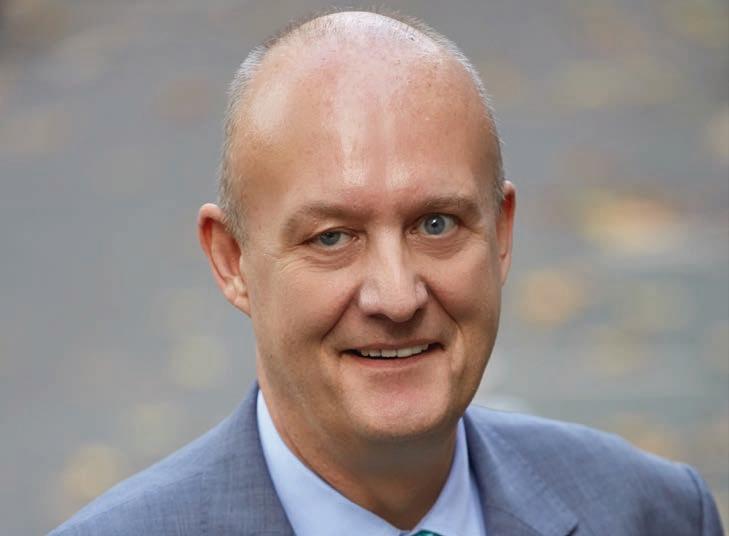



business
LEADER’S
to dementia
PINDER'S HEALTHCARE
round-up the highlights from this year's flagship event
10
SPOTLIGHT Director of care quality Cheryl Baird on how Orchard Care Homes is shifting negative attitudes
18
DESIGN AWARDS We
22 IN FOCUS Chief operating officer Amanda Smith introduces new luxury market entrant Connaught Care 8 COVER STORY Care England chief executive Martin Green says the government's cost of care exercise has been fundamentally flawed
Chief executive officer
Alex Dampier
Chief operating officer
Sarah Hyman
Executive assistant
Kirsty Parks
Editor-in-chief
Lee Peart
Features editor
Charlotte Goddard
Subeditor
Charles Wheeldon
Advertising & event sales director
Caroline Bowern 0797 4643292 caroline.bowern@nexusgroup.co.uk
Exhibition sales manager
Nijeesh Hareendranath nijeesh.h@nexusgroup.co.uk
Event operations manager
Carly McGowan
Operations executive
Sophia Chimonas
Senior conference producer
Teresa Zargouni
Head of digital content
Alice Jones
Marketing design manager
Craig Williams
Marketing campaign manager
Sean Sutton
CRM database manager
Annalisa La Manna
Lead developer
Jason Hobbs
Web developer
Michael Reeves
Hyman
Do we need a National Care Service?
At the time of writing, the Scottish National Party was preparing to choose a new leader for Scotland following Nicola Sturgeon’s shock decision to stand down.
The implications for social care in Scotland could be profound as the SNP has stated its intention to launch a National Care Service by the end of the current Parliament.
The plans have come in from universal criticism from care home providers and opposition leaders for lacking detail and being undercosted. And each of the three candidates for the SNP leadership – Ash Regan, finance secretary Kate Forbes and health secretary Humza Yousaf, have said they will revisit the plans if elected, with a Bill for the legislation being delayed until June.
Meanwhile, in England, the Labour Party has put forward its own ideas for a National Care Service inspired by the NHS that would be publicly run and publicly funded and free at the point of need.
Here too reaction from the social care sector has been mixed at best. Writing
in Caring Times in September, chief executive of Care England, Professor Martin Green, described Labour’s proposals as a “major mistake”.
While current proposals from the SNP and Labour lack detail and are far from perfect, the creation of a national body to represent social care would give the sector the single voice that it currently lacks as well as a new brand identity and clout to rival that of the NHS.
A single body would also provide the opportunity to establish a framework to ensure a national floor for funding and workers’ wages and help develop career pathways and training and continuing professional development for our much undervalued carers.
With it likely to be years before a National Care Service sees the light of day, the debate about its merits and flaws will rumble on and on.
Lee Peart Editor-in-chief Caring Times

business | welcome 4 | APRIL 2023 CARING-TIMES.CO.UK
5th
4RF Tel:
Caring Times is published 10 times a year by Investor Publishing Ltd. ISSN 0953-4873 © Investor Publishing Limited 2023 The views expressed in Caring Times are not necessarily those of the editor or publishers. Caring Times™ and the CT® logo are registered trademarks of Nexus Media Group @Caring_Times linkedin.com/company/caring-times business contents
NEWS IN BRIEF Our round-up of last month's big stories 08 COVER STORY Care England
Green says the cost of care exercise has been fundamentally flawed 10 LEADER’S SPOTLIGHT Director of care quality Cheryl Baird on how Orchard Care Homes is shifting negative attitudes to dementia 14 SURVEYS & DATA Health Foundation poll finds public have negative view towards social care services 16 POLICY & POLITICS Scottish Conservatives MSP Craig Hoy and Labour MSP Jackie Baillie give their views on plans for a National Care Service 18 PINDERS HEALTHCARE DESIGN AWARDS We round-up the highlights from this year's flagship event 22 IN FOCUS Chief operating officer Amanda Smith introduces new luxury market entrant Connaught Care 24 PEOPLE MOVES The latest big people moves in the care home sector 25 PROPERTY & DEVELOPMENT We look at last month's highlights 26 SUSTAINABILITY MATTERS Oakland Care advises on how to take small green steps and Jonathan Freeman introduces the new Social Care Sustainability Alliance 28 LEGAL & REGULATORY Ridouts looks at the challenges of getting your care home re-inspected after a poor CQC rating
Publisher Harry
Investor Publishing Ltd,
Floor, Greener House, 66-68 Haymarket, London, SW1Y
020 7104 2000 Website: caring-times.co.uk
06
chief executive Professor Martin
SOCIAL CARE EVENTS IN 2023



07 June 2023
Grosvenor House Hotel, London
30 June - 01 July 2023
NEC Birmingham
28 September 2023
Business Design Centre, London
24 November 2023
Platinum Suite London
news | business CARING-TIMES.CO.UK APRIL 2023 | 5
EVENT VENUE INFO
News in brief
POLICY & LEGISLATION
Last month’s Spring Budget announcement by the chancellor was branded “a missed opportunity” by care providers. Chancellor Jeremy Hunt’s announcement contained no new money for adult social care after £7.5 billion was provided over two years in the Autumn Statement.

A third of adult social care providers have considering exiting the market due to financial pressures over the past 12 months, new research revealed. The findings were published in the ‘Sector Pulse Check’ report, a piece of independent research commissioned by national learning disability charity Hft and Care England, which was launched at the Care England conference last month.
More than one million NHS staff in England will receive an additional pay rise as part of a deal agreed between the government and unions. The agreement with the RCN, Unison, GMB, CSP and BDA, includes a one-off bonus of at least £1,250 per worker and a 5% pay increase for 2023/24.
The Scottish government faced further questions over its handling of the pandemic after research by an NHS trust revealed a care home Covid outbreak
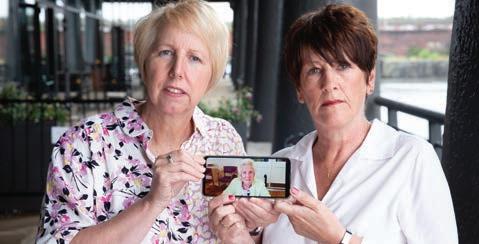


was caused by a patient discharged from hospital. The study by NHS Lothian in partnership with the University of Edinburgh focused on patients discharged from hospital to 130 care homes between 1 March 2020 and 31 May 2020.
barriers people with a learning disability and autistic people face when trying to leave long-stay hospitals in England.
Leading care campaign groups the Relatives & Residents Association (R&RA) and Rights for Residents joined forces. Following the merger, the Rights For Residents campaign will continue under R&RA. The merged organisations are also in the process of a rebrand, including a new look and a new name which will launch over next couple of months.
LEGAL & REGULATORY
Care England called on the government to fix social care after a new report revealed around 2,000 people with a learning disability and autism are in inappropriate care settings New research from the University of Birmingham and the rights-based organisation Changing Our Lives, ‘Why are we stuck in hospital?’, explored the
Care Quality Commission staff voted for strike action over pay, workforce union Unison revealed. Almost threequarters (73%) of more than 700 workers, including those in the health and social care teams, voted to walk out, with 92% calling for action short of a strike.
Care homes have made improvements in oral health but residents continue to miss out on vital care from dentists, according to a Care Quality Commission report. The CQC review on the state of oral healthcare in care homes across England found that awareness of National Institute for Health and Care Excellence oral health guidelines had increased from 61% of care homes in 2019 to 91% in 2022. It also found an increase in the proportion of care plans that cover oral health needs, from 27% in 2019 to 60% in 2022. However, inspectors remained concerned that people living in care homes are missing out on vital care from dental practitioners at the right time and in the right place.
business | news 6 | APRIL 2023 CARING-TIMES.CO.UK
Jeremy Hunt
Martin Green
Campaigners Jenny Morrison and Diane Mayhew
The Scottish government faced more criticism over its handling of the pandemic
The Care Quality Commission was accused of failing to keep residents safe after an 89-year-old man died following his stay at a Dorset nursing home. Lyme Regis Nursing Home, which is operated by Farrington Care, was still rated Good when Bernard Chatting moved in, six weeks after the CQC inspected the service due to a tip-off over risks to residents on 16 February 2022. The home is currently rated Requires Improvement.
A care home recruiter was banned for seven years after abusing Covid loan schemes during the pandemic. An investigation by the Insolvency Service found James Ireri took out £150,000 in loans across separate schemes but failed to show the money was used to support his business.
Wirral Council is to publish CQC care home ratings on its website in order to increase transparency and raise families’ confidence in services. Under a new policy the council said it would suspend placements to underperforming services.
Bupa’s Eglantine Villa Care Home was rated Outstanding for the third time in a row. CQC inspectors praised the Dartford home's person-centred culture, which enables staff to build close relationships with residents and results in highly personalised care. The report highlighted the involvement of residents and families in decision-making, as well as the provision of care that promotes their dignity and encourages independence.
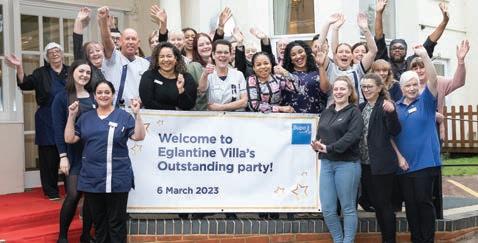
STAFFING
Ideal Carehomes announced an 8.5% pay rise for all hourly paid staff. The care provider is investing £2.5 million annually in increasing staff wages and marks its fourth wage rise in two years – a £6 million investment adding 20% to salaries.
Not-for-profit care provider The Orders of St John Care Trust invested £6 million in continuing to pay all its workers the Real Living Wage from 1 April. All employees will be paid at an hourly rate of £10.90 or above with care staff paid £11.07 or above per hour.
Thousands of young people attended the first ever national care careers conference for students in schools and colleges, organised by Hallmark Foundation and Working Options in Education on 7 March. ‘Who Cares?’ featured a line-up of speakers including former politician and broadcaster Ed Balls, Deborah Sturdy, chief nurse for adult social care at the Department of Health and Social Care, and life coach Jermaine Harris. The event also staged UpFront Theatre Company’s production ‘What makes a good carer’.

PROPERTY & FINANCE

Care home occupancy continued its recovery from pandemic levels in 2022, according to research by estate agent Knight Frank. The latest edition of the UK Healthcare Property Market Overview shows occupancy levels rose to 84.3%, up from 79.4% in 2021.
WHAT’S ON?
Championing Social Care announced Virgin Money, Civitas Investment Management and Christie & Co as its headline partners for this year’s Care Home Open Week, the flagship event in the social care calendar, which runs from 26 June to 2 July, provides care homes up and down the country with the opportunity to showcase what they have to offer, including their facilities, activities and career opportunities.

CARING-TIMES.CO.UK APRIL 2023 | 7 news | business
Eglantine Villa
Ideal Carehomes managing director Stacey Linn
Shadow minister for social care speaks the Who Cares? national care careers conference
A fair price for care
In his latest quarterly column Professor Martin Green, chief executive of Care England, says the government’s cost of care exercise has been fundamentally flawed.
As part of the preparation for the reform agenda, the government initiated the cost of care exercise in which they invited care providers to analyse the costs of care so that we were much better informed about the true cost of delivering highquality care in each local authority area.
This exercise was trumpeted by the government as a way to collate data on what it actually costs to deliver care, but the data collection exercise took place before the war in Ukraine and before some of the inflationary increases and energy cost hikes that we saw last year, so it was clear to everyone that even when we have the figures, they would be below today’s costs.
Initially, the government said that the data would be released at the end of last year. This would help local authorities to move towards the true cost of care. However, in the event, this data was only released about a month ago and so would not have a significant impact on this year’s funding settlements.
There were many flaws in this exercise, one of the major ones being that many people’s data was excluded because the local authority did not like
“The behaviour of both central and local governments in relation to this cost of care exercise has been little short of shameful. The government decided to embark on this process, and care providers spent significant amounts of time, energy and money, collating the data and sending it to their local authorities.”
what it showed. They seemed to ignore the fact that many services are only for self-funders, but they still have a vital role to play because they show what the level of the market is in any locality.
If you exclude this data, it gives a very skewed picture of the cost of care, and market analysis needs to benchmark what the market will pay rather than focusing only on cost.
In some areas, local authorities have said they cannot afford what the data is telling us, so they are not going to pay for it. Though they still expect people to deliver those services at the price they decide is appropriate. Can you imagine if the council taxpayers in that area decided to send the council what they thought they could afford but told them they expected to get all
“Can you imagine if the council taxpayers in that area decided to send the council what they thought they could afford but told them they expected to get all the services that they currently receive? ”
the services that they currently receive? The council would have you in court and demand that you pay what they charge. This, for me, underlines the double standards that are so much a part of local authorities. While they talk endlessly about what they cannot afford, they are quite happy to put huge contributions of taxpayers’ money into their staff’s index-linked pension funds or, indeed, make enormous payoffs to staff who have not delivered. In the case of one authority, this was more than £200,000 for one officer.
The behaviour of both central and local governments in relation to this cost of care exercise has been little short
“I shall be extremely interested to see what role the Care Quality Commission will play in making sure funding is appropriate when it has oversight of commissioning.”
of shameful. The government decided to embark on this process, and care providers spent significant amounts of time, energy and money, collating the data and sending it to their local authorities. Many care providers were told their data would not be used for various spurious reasons. The government reneged on its promise to deliver this data in a timely fashion and seems incapable of doing anything to ensure that local authorities respond to this data and offer a fair price for the care.
I shall be extremely interested to see what role the Care Quality Commission will play in making sure funding is appropriate when it has oversight of commissioning. In recent weeks I have noticed a change in language from the CQC, and it talks about oversight rather than regulation. I have absolutely no confidence in the new role the CQC will play in overseeing local authority commissioning because we have seen the partisan and differential approach it adopts when it regulates the NHS compared to social care. There are so many things that the public sector gets away with which would never be tolerated in independent care services. In short, the entire system is weighted against independent care providers. The government pays lip service to fund at sustainable levels, but only does something tangible when local authorities behave badly.
business | cover story 8 | APRIL 2023 CARING-TIMES.CO.UK
COMING EVENT: Health and Social Care Workforce: Wellbeing, Integration and Sustainability
On 18 May, Care England will be hosting a highly interactive, in-person event examining how to improve wellbeing, integration and sustainability of the health and social care workforce. The event will discuss integrated care systems and how they can play a vital role in driving integration to achieve better outcomes looking at what works and what doesn’t, challenging artificial boundaries and exploring much needed innovation for the sustainability of the health and social care workforce. Join to launch the big ideas – and recommend actions – that could break boundaries and transform the workforce agenda. If you would like more information regarding the event, please email: alessandro.alagna@ talentforcare.uk This exclusive event is limited to 100 delegates, with a few spaces available. Scan the PR code to sign up for the event.

cover story | business CARING-TIMES.CO.UK APRIL 2023 | 9
Martin Green
Shifting negative attitudes
Director of care quality Cheryl Baird explains how Orchard Care Homes is aiming to shift negative attitudes to people living with dementia through its Dementia Promise.
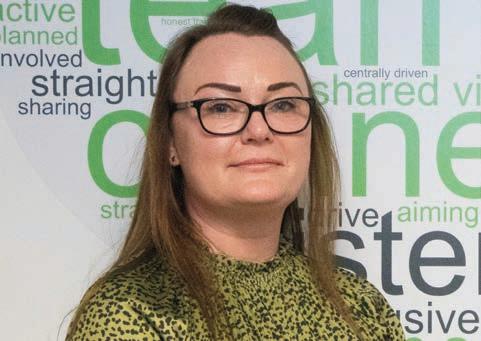
Launched in September 2022, the new Dementia Promise initiative embodies Orchard’s commitment to challenge the negativity and inequalities often experienced by people living with dementia in care homes.
The Dementia Promise aims to: remove conscious and unconscious stigma associated with dementia by encouraging others across the sector to stop using derogatory, blaming language; promote genuine collaboration; and provide people with dedicated communication lines with a dementia specialist, regardless of whether they use Orchard’s services.
“As a group we have seen the pitfalls in dementia care within social care,” Baird says. “Dementia care hasn’t really changed in the last 30 years. When health and cancer care seem to have moved on, dementia care seems to have been stuck in a bit of a rut. People are moving into care homes with a diagnosis of dementia and carers are trying to support them with all the goodwill in the world, but they are really taking away their individuality and personality.”
Work on the programme began when Orchard updated its policies on dementia care and mental capacity at the end of 2020 and beginning of 2021 after the height of the Covid pandemic.
“It would have happened anyway, but we saw how distressed people living with dementia were when we were forced to lockdown, so we had to start
thinking quite quickly about how to support them,” Baird says. “From there we realised people weren’t always being given the opportunity to be individuals and that’s our main aim. The Dementia Promise is grounded in people’s abilities and their individuality and all we are doing ultimately is seeking to normalise their life. Just because they live in a care home doesn’t mean they can’t enjoy a life like everyone else.”
In developing the model, Orchard began by looking at its four designated dementia Reconnect Communities.
“We welcome people into our Reconnect Communities who have predominantly been in a mental health ward and have been on one-to-one or two-to-one care because their distress response behaviours are seen as so risky and care providers don’t feel that they can support them,” Baird says.
Orchard’s Reconnect Communities are also expanding as part of the Dementia Promise with more being planned, adding to the four established communities in the Northeast, West Yorkshire and Warrington.
Each community houses around 18 people and includes kitchen and living room spaces as well as breakout areas
to encourage a homely and calming atmosphere.
Staff ratios are high, at one carer to three people typically, to ensure that social needs and engagement opportunities are met and there is more time to focus on meaningful engagement to reduce anxiety and distress levels.
“It’s really thorough, focused, individualised support,” Baird explains. “People get far more time and support to regain their identity and some skills. We had people coming in who weren’t verbalising and now they are making their needs known and going out and shopping or going to the pub and planting in the garden. It’s a real turnaround for many of those now living with us.”
Each community is staffed by specialist employees who are paid at a higher rate, approximately 20% more than care home workers, due to the demanding, high-intensity nature of the care provided.
“It can be quite tough and you have to be quite a special person, but it’s so rewarding when you see the change in the people you care for,” Baird explains.
Specialist facilities are provided in
business | leader’s spotlight 10 | APRIL 2023 CARING-TIMES.CO.UK
Cheryl Baird
“It would have happened anyway, but we saw how distressed people living with dementia were when we were forced to lockdown, so we had to start thinking quite quickly about how to support them.”
“The workshops are a great resource and we have supported with tasks like simple mending and building bird houses. One gentleman loves to simply take things like bits of machinery apart and put them back together again.”
the communities to help encourage freedom and independence, including a workshop, laundry and a bowling green.
“The workshops are a great resource and we have supported with tasks like simple mending and building bird houses,” Baird says. “One gentleman loves to simply take things like bits of machinery apart and put them back together again.
“A lot of care providers are really risk averse so we had a lot of people being nervous about the safety of the workshop, but we had put mitigating risk assessments into place so that some of the gentleman can go in and safely fix things and paint the walls. We are just trying to normalise people’s lives.
“We have really focused on the environment and making sure there’s lots of space to walk around and people are not on top of one another. Each sitting area has a kitchenette, so they
are encouraged to make their own tea and get a snack to make it more homely.
“We have some beautiful outside spaces where people can go and can get fresh air and be meaningfully occupied with things like raised planters and a bowling green at one of the homes. The communities are more people-led as we like them to have more freedom to dictate the way the day goes. We are focused on positive outcomes and independence and giving people their identity back.
“When we saw the impact our work was having on the reduction in distress responses, it led us to developing our Dementia Promise. We wanted to look at rolling out a similar approach for people in our homes who did not have such distressed responses.” >
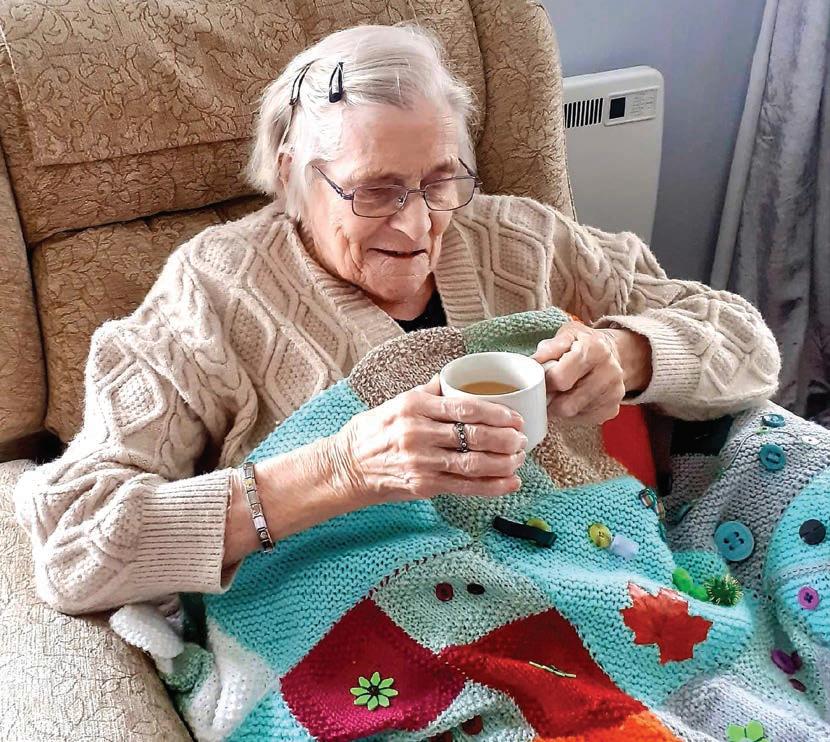
leader’s spotlight | business CARING-TIMES.CO.UK APRIL 2023 | 11
“The workshops are a great resource and we have supported with tasks like simple mending and building bird houses. One gentleman loves to simply take things like bits of machinery apart and put them back together again.”
As part of its Dementia Promise, Orchard committed all staff receiving bespoke, evidence-based training. The programme comes in three levels catered towards caring for people with different degrees of dementia.
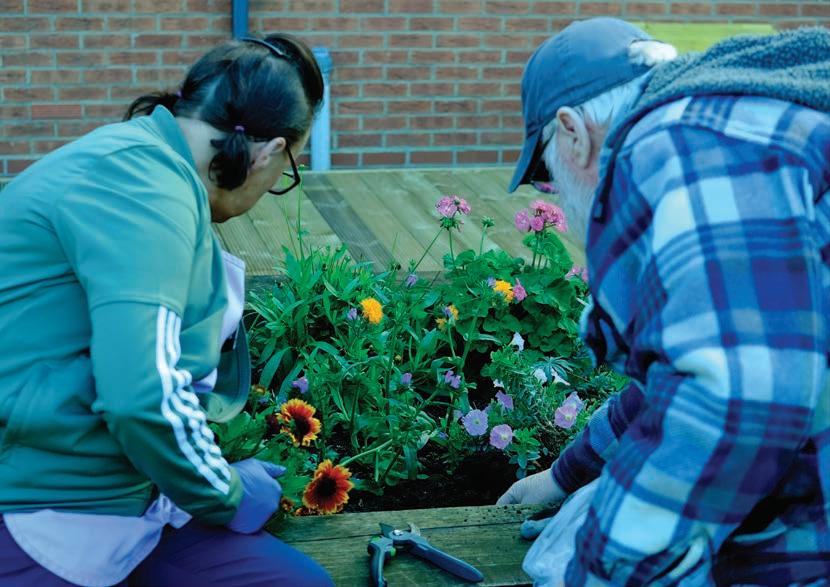
“All people who work in the organisation whether they work in IT or the kitchen for example will receive Level 1 training,” Baird explains.
“Staff who support anyone in our care homes will do Level 2, including our maintenance operatives. Level 3 is in-depth, mainly for our Reconnect
Communities and we will then open that up to advocates across all of the homes.
“In Level 3 we start to focus on what can trigger distress in the environment. That could be noise. We get people thinking about all of that. A lot of care homes can be quite infantilising with big bright colours and big pictures and that can sometimes cause people distress. Our Reconnect Communities are quite calming with lots of different spaces such as reading nooks and planting rooms. If they want a bright red bedroom, they can still have it, but the communal spaces are not childlike, they are more like a home. We also go into physical health because sometimes if you have a diagnosis of dementia other ailments can be forgotten. A lot of these people are still living with diabetes and heart disease and COPD.
“We want to have at least a handful of people trained to Level 3 in every home where one of the big objectives is family support, as that is currently in need. These levels are about involving people in their care plans, activities and normalising life and how we can
empower those who have, in some respects, been written off. It’s about empowering carers to advocate for people living with dementia and help them live a full life.
“To wrap up the training sessions, we do a pre- and post-service valuation covering audits, the environment and knowledge.”
Investment in technology is a further core component of the Dementia Promise.
“We already had Person Centred Software’s electronic care planning and Medecare medication management when I joined, which has been invaluable,” Baird explains.
Introducing the intelligent pain assessment tool PainChek, was further instrumental in supporting the Dementia Promise. Using AI technology, PainChek recognises and records facial muscle movements indicative of pain. The system then calculates an overall pain score and stores the result which supports the implementation of pain management interventions and the ongoing monitoring of their effectiveness.
12 | APRIL 2023 CARING-TIMES.CO.UK > business | leader’s spotlight
“ We are quite harsh on ourselves. We measure ourselves as either low risk, medium risk, high risk or very high risk.”
“We have carried out over 50,000 PainChek assessments,” Baird says. “PainChek supports us with our falls prevention work. We are using it with everybody. The main benefit is making sure people have proper prescribed pain relief which has helped drive down anti-psychotic use. If people have fallen over, we can see if they have hurt themselves if they can’t communicate that. We use before and after PRN medication to test its effect, and we have managed to get people’s medications changed so that they are more comfortable. It’s helped drive down multi-medication use because some people were on lots of pain medication and we have been able to use the data to go back to the prescribers and look at possible alternatives.
“We are using that feedback to see which of our homes need training next,” Baird says. “It gives us that preand post-data and allows us to monitor
that things are going in the right direction.”
With Orchard having implemented fully integrated care systems, Baird is able to pull all of that data every month into a metrics spreadsheet, which she sends out to the whole organisation, including the board, for transparency so that they can see where improvements need to be made.
Implementation of the new technology has helped achieve impressive results with medication errors down by 50% and falls reduced by 16% in a year.
More recently, Orchard has implemented Access Care Compliance for its audits which includes feedback from staff, residents, medical professionals and families and friends.
“With the Access Care Compliance audits I can see very quickly where a home needs focused support and either myself or my team will go in and provide that support,” Baird says.
The implementation of technology has helped Baird and her team drive care quality levels, with all but one of the provider’s 23 homes now rated Good by the CQC.
“We have internal quality monitoring inspections aligned to the KLOEs but go into a bit more detail,” Baird notes. “We are quite harsh on ourselves. We measure ourselves as either low risk, medium risk, high risk or very high risk.”
Baird says she had no doubt that Orchard’s one remaining Requires Improvement home, Nesfield, would be rated Good if inspected now and expressed her frustration at the 18-month wait the service has endured since its last inspection.
“That home is not Requires Improvement and we can’t get that rating changed because there is no risk around it,” Baird complains.
The care quality director described the CQC’s inspection regime as “very inconsistent” adding her hope that its new framework which is expected to be rolled out by the end of the year would provide a “truer picture of care quality”.
“It’s really difficult for them to come into a home and say what has been good, bad or indifferent in one or two days, you need to look at a longer time frame of what has been going on,” Baird says. “I don’t see how the current way of working gives a true picture of care quality with so much dependent on what is going on at the home on that particular day. We hope the new model of inspection will change this.”
Despite the sluggish inspection system, Baird expresses confidence in reaching Orchard’s target of 100% Good or Outstanding in the not too distant future.
The Dementia Promise looks set to play a key role in helping Orchard achieve that goal.

CARING-TIMES.CO.UK APRIL 2023 | 13
leader’s spotlight | business
Negative view of social care
The public are generally negative towards social care services and there is strong support for most policies to improve workforce shortages, a poll has found.
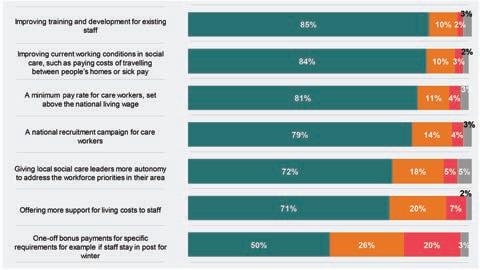

The survey by The Health Foundation was conducted between 24 and 30 November last year, with 2,063 responses from people aged 16 and older across the UK.
Two-thirds (63%) said the standard of care had got worse over the past 12 months, with over half (57%) expecting it to continue to get worse over the next 12 months.

Respondents were fairly negative about social care services in their local area, with only 11% saying they were good and 33% saying they were not good.
Positive perceptions towards local social care services declined from May 2022, when 15% of the public said they were good. Very few thought the government had the right policies in place for social care (7%), while those who did not think the government had the right policies increased from 59% in May 2022 to 65% in November 2022.
Those aged 25-34 (66%) or who intend to vote Labour (65%) were more likely than the average (54%) to disagree that the government has the right policies in place to improve public health. Conversely, individuals aged 16-24 (22%) were more likely than the

To what extent do you agree that the government has right policies in place to improve public health?
average (13%) to think the government has the right policies in place.

Those who have accessed NHS 111 (63%) or mental health services (66%) were more likely than the average (54%) to think that the government does not have the right policies in place. Social care workers (32%) or individuals who know someone who has used social care services (31%) were more likely to agree that the government has the right policies in place (13% overall).
To what extent do you support or oppose each of the following measures as a way of addressing current workforce shortages…?

“Positive perceptions towards local social care services declined from May 2022, when 15% of the public said they were good.”
Individuals who live in the Northeast (25%) or East of England (20%) were more likely to agree that the government has the right policies in place (13% overall).
Graduates (66%), full-time workers (61%), households earning £52k-£99k (65%) or those working in managerial roles (61%) were more likely than the average to disagree that the government has the right policies in place (54% overall).
Those aged 16-24 and who intend to vote Conservative were more likely to think social care services in their area were good and that the government had the right policies in place. Those who had personally used social care services in the last year and social care workers were more positive about government policies for social care.
business | surveys & data
14 | APRIL 2023 CARING-TIMES.CO.UK
To what extent do you agree or disagree with each of the following statements... Social care services in my area are good The government has the right policies for social care
“While the public supported faster visa processes (65%), cheaper visa processes (61%) and recruiting more workers from outside the UK (57%), support was lower than for other measures to address workforce shortages.”
Those aged 55-74, who live in Yorkshire and the Humber and the East Midlands, or who work in managerial, administrative and professional occupations were more likely to disagree that social care services in their area were good or that the government has the right policies in place for social care. People with friends or family who have used social care services in the last year were more likely to think the government does not have the right
policies for social care.
Those who have used social care services in the past year (themselves, or friends or family have), or are social care workers, were more likely to give an opinion due to familiarity with social care services, although on balance they remain negative rather than positive.
There was generally strong support for most measures to address workforce shortages in social care, especially improving training and development for existing staff (85%), improving current working conditions in social care, such as paying costs of travelling between people’s homes or sick pay (84%), and a minimum pay rate for care workers set above the National Living Wage (81%).
There was less (although still in the majority) support for measures which would require changes to current UK immigration policies (ranging from 57% to 65%). There was the least amount of support for one-off bonus payments at 50%.
There tended to be more support for a one-off bonus policy among those


To what extent do you support or oppose each of the following measures as a way of addressing current workforce shortages…?
aged 25-44 (57%), people from ethnic minority backgrounds (59%), households earning up to £26k (55%), or those who intend to vote Labour (56%) compared with the average (50%). There tended to be more opposition for this policy among those aged 55-plus (25%), those from white ethnic backgrounds (22%), with a vocational or professional qualification (30%), with children in the household (22%), who work in managerial, administrative and professional occupations (23%), or those who intend to vote Conservative (28%) compared to the average (20%).

While the public supported faster visa processes (65%), cheaper visa processes (61%) and recruiting more workers from outside the UK (57%), support was lower than for other measures to address workforce shortages.

Men, those with graduate degrees, households earning £52k or more, from the South, working in managerial, administrative and professional occupations, who intended to vote Labour, Liberal Democrat, or Green Party, or have used any NHS service, were all more likely to support changes to immigration policies compared with the average. Those from older age groups, non-graduates, those working in lower supervisory and technical occupations, or intending to vote Conservative or other, were all more likely to oppose these policies compared with the average.
There was increased support for an increase in National Insurance from May 2022 to fund health and social care (up from 16% to 25%), possibly due to the removal of the Health and Care Levy in between surveys.

surveys & data | business CARING-TIMES.CO.UK APRIL 2023 | 15
Policy hot seat
William Walter, managing director of adult social care PR consultancy, Townsend Communications, interviews Craig Hoy, Scottish Conservative MSP and shadow minister for social care to get his take on the SNP’s proposals for a Scottish National Care Service.
What are the implications of the SNP's proposals for a National Care Service in Scotland?
The proposal would centralise Scottish social care by taking decision-making away from local authorities and care providers and putting it in the control of Scottish ministers and a bloated billionpound bureaucracy.
The proposals have been challenged by third-sector organisations and politicians from every major political party in Scotland, which is why the government has now paused this legislation at the first stage.
While the Scottish government has stripped local authorities of funding, they plan to centralise social care at a cost of up to £1.3 billion to employ up to 700 civil servants and set up the service over the first five years. This is the last thing a system already in crisis needs right now.
How can social care become a fit-forpurpose sector with appropriate funding
levels without a national body to represent and fight for it?
Social care in Scotland is not fitfor-purpose and creating a National Care Service simply diverts money and decision-making away from the front line.
The majority of Unison members have expressed concerns about its implications.

At a time when social care staff are already stretched and many are considering leaving the social care sector altogether, it is counter-intuitive to focus resources on creating a body which is unwanted by those working, or receiving care, within it.
For our social care to be fit-for-purpose, the Scottish government needs to resolve issues relating to pay, terms and conditions for social care staff which have resulted in high rates of turnover. They must also improve training opportunities for care staff and managers and engage more with social care professionals.
How would a Scottish Conservative government go about improving pay and conditions for those working in the sector?
I recognise pay, conditions and career progression need to be improved within the sector if we are to retain care workers in the service. To address the problem the Scottish Conservatives would divert funding from the SNP’s National Care Service directly to front line care.
We would build minimum pay, terms and conditions into the commissioning and procurement of care, ensure that commissioned care services reward length of service and positive job performance with pay progression, empower the Scottish Social Services Council to provide accessible training and qualifications for carers, and amend the Carers Act to provide unpaid carers with automatic rights to support breaks from caring.
Social care workers play a pivotal role in our society and steps need to be taken to resolve the crisis in our social care system now, not in over five years’ time after the introduction of a costly and bureaucratic National Care Service.
How would a local care service underpinned by a ‘local care guarantee’ better serve those in need of care in Scotland?
A ‘local care guarantee’ would mean that no individual would be forced to access care miles away from their community, family and support networks. This means keeping care within the community and giving social care service users agency to access care locally.
Many of the terrible experiences charted in Scotland’s social care system stem from a lack of personal agency and diversity of choice. The SNP government, local authorities, health boards, integration boards and providers should place individual choice and control at the heart of everything they do in relation to social care.
Often this means supporting people to live independently and in their own homes as far as possible.
16 | APRIL 2023 CARING-TIMES.CO.UK business | politics & policy
Craig Hoy
Nothing but a power grab
Many of us involved in politics and governance have long appreciated the absolutely vital role that social care plays as a key partner to the NHS. For others, the pandemic revealed just how essential social care is for our society.
Overnight, the people of the UK recognised the incredible contribution that care workers make – including in the most dangerous of situations.
As such, I was delighted when the SNP government – which until that point had nothing of note to say about social care or the workforce – announced it would seek to legislate for a National Care Service.
The idea of a National Care Service to lift standards and support the workforce was first developed by Scottish Labour over a decade ago – while Nicola Sturgeon was adamantly opposed to the

plan at the time, I was very encouraged to watch her Damascene conversion to the cause of reform.
But as the excitement dissipated, it became clear that what the SNP really had in mind was not the National Care Service that Scotland needed. Rather than transforming culture, the SNP focused on structures, and rather than focusing on improving staff conditions, the SNP focused on spin.
Instead of listening to the workforce and the trade unions, the SNP spent a fortune on consultancy firms. And the resulting plan was nothing more than a power grab from local councils that would do nothing for the workforce, make little impact on care standards and completely fail to reform the sector as needed.
What the SNP offered us was nothing
more than a National Centralisation Service which will do nothing to support those receiving care or help the workforce.
Fresh from months of defending the bill to the hilt, then health secretary Humza Yousaf was more than happy to concede the need to put the bill on the back-burner as part of his SNP leadership election. It seems that the prospect of career advancement is enough to make any SNP spokesperson perform an aboutturn on just about any issue.
And while this bill is stuck in legislative limbo, thousands of Scots are still paying through the nose for non-residential care charges that the SNP promised to scrap years ago.
For the workforce – much applauded, but little rewarded – nothing has changed. Instead, the SNP has time and again lined up with the Tories to vote against Labour proposals to boost their pay.
Scotland’s care workers and those for whom they care do not need promises of jam tomorrow – they need reform now. That’s why Labour remains committed to real and meaningful reform of the care sector, giving it equal value to the NHS, which will also help to tackle the crisis in our NHS.
Reform that puts workers and those receiving care before government mandarins and consultancy firms.
Reform that can change lives and build a solid foundation for looking after the most in need in our society.
While the SNP turn their gaze inwards, it is the Scottish Labour party that is listening to care workers and planning the care sector of tomorrow.
CARING-TIMES.CO.UK APRIL 2023 | 17 politics & policy | business
Jackie Baillie, Scottish Labour MSP and spokesperson for health, social care and equalities, sets out her thoughts regarding the SNP’s proposal for a National Care Service.
“The idea of a National Care Service to lift standards and support the workforce was first developed by Scottish Labour over a decade ago.”
Jackie Baillie
business | pinders awards








18 | APRIL 2023 CARING-TIMES.CO.UK
Comedian Simon Evans
Jon Chapman
Avnish Goyal, Dasos Kirtsides and Bhavna Keane-Rao
Jimmy Tarbuck led awards presentations
Yorkare took the prize for favourite care home design
Pinders founder Nick Borrett
Bowing out in style
Pinders senior consultant Jon Chapman bowed out in style as host of the Pinders Healthcare Design Awards last month.
Over 660 guests gathered for the first flagship event of the social care awards season to honour the best in care facilities design and bid a fond farewell to Chapman who has hosted the event for the past 25 years having taken over from event founders Nick Borrett and Michael Monk and original sponsors AIB Bank.
“My fellow director Mark Ellis and I resurrected the event in 1998, bringing on board a number of the banks to share the sponsorship,” Chapman reflected. “Our first show was a modest affair, with an audience of around 150. We then transferred to the Hotel Russell for several years, then Lords Cricket Ground, before moving to the larger capacity of The Royal Lancaster.”
Best interior design
This year’s celebratory event was as ever a fun cocktail of laughter, games and music served up in Chapman’s inimitable style. Laughter aplenty was provided by standup comedian Simon Evans and living legend Jimmy Tarbuck who shared his reminiscences of Judy Garland, Elvis and The Beatles before presenting this year’s awards.
Hallmark chairman Avnish Goyal, Bhavna Keane-Rao, managing director of BKR Care Consultancy and Dasos Kirtsides, head of healthcare, Shawbrook Bank, rolled an enormous furry dice to find the lucky winners of this year’s raffle.
In his closing speech Chapman reflected on the sad passing of his former event
Sponsored by
FINALIST
Heathland House, Ferndown
partner Mark Ellis before receiving a standing ovation for having brilliantly hosted and organised the event for the past quarter of a century. Chapman also presented a special award to Yorkare (its second of the night) for Lindsey Hall in Cleethorpes which he selected as his favourite care home design.
Carehome.co.uk director Davina Ludlow, Nick Borrett and Caring Times founding editor Dr Richard Hawkins led tributes to Chapman’s marvellously idiosyncratic hosting of the awards before he stepped down in typically quirky style by leading a karaoke rendition from the Singing Cowboy.
Great job Jon, You’ll be missed!
Owner: The Cinnamon Care Collection
Design team: Catalyst Interiors, Harris Irwin Architects and The Highwood Group

The interior design concept at this 73-bed home was to create a luxurious yet homely environment where residents have the choice to live independently or with care and support added as often or as little as it is needed. To this end, there are facilities which enable residents to continue living their lives, following their regular pastimes as they would do at home.
Bespoke shelving and divider units are cleverly used to break up larger spaces and angled display cabinets provide instant recognition for residents as they enter their bedrooms.
WINNER
Blythe Rose, Shirley
Owner: MACC Care
Design team: Care Home Interiors, AP Architecture, DC Construction and Alan Capeling Landscapes
This 80-bedroom specialist dementia and nursing home is divided into a number of small-group lodges, each with its own unique style based on local themes. They offer different levels of care and help residents to retain a sense of identity and autonomy within a calming and relaxing environment.
While the external architecture of Blythe Rose is extremely modern taking reference from the local architecture, its internal style is a blend of traditional and contemporary, including a 1960s-inspired family room where loved-ones can gather amid familiar surroundings of yesteryear and perhaps prepare and enjoy a meal together.
Residents from the individual lodges are encouraged to visit the hairdressers, cinema and café within the central ‘High Street’ area, and the fully stocked shop, where ingredients and meals from the central kitchens can be collected, maintaining familiarity, a sense of purpose and the feeling they are maintaining their independence.
FINALIST
Richard House, Grantham
Owner: Tanglewood Care Homes
Design team: Care Home Interiors and C-Squared Architects

Faced with a restricted budget, the designers’ creativity was tested. Bespoke wallpapers, painted ceiling panels and contrasting handrails provide subtle but effective cues to navigation through this 68-bed home.
The brief was to create a series of individual destination spaces which combined comfort and stimulation in equal measures. This is evident in the distinct identities of the garden room, sky bar, games parlour and Alice in Wonderland tearoom, where residents and visitors compete to occupy the golden thrones.
FINALIST
The Gables, Hagley
Owner: Cinnamon Care Collection
Design team: Catalyst Interiors, Harris Irwin Architects and Stepnells
The design objective was to make this 61-bed home feel warm and welcoming, while also being light and bright. The aim is to bring the surroundings into the room interiors by day and then transform the outdoor terraces at night, using lighting to create a dramatic visual backdrop to the lounge, restaurant and bar, where residents can gather to share time with friends, family and other residents.
CARING-TIMES.CO.UK APRIL 2023 | 19 pinders awards | business
business | pinders awards

Best exterior
Best architecture
Sponsored by
WINNER
Buckler’s Lodge, Crowthorne
Owner: Halebourne Care Group and Greensleeves
Design team: ADG Architects, Dalton Homes and WA Associates
The importance of outside space at this 80-bed home is clearly evident from the extent of the glazed balustrading. There are several stepped balconies and roof gardens to both the upper floors, providing adaptable amenity spaces and splendid views across the two acres of landscaped gardens and woodland to the open countryside beyond.
Level footpaths connect to the ground floor patios and weave within the extensive grounds, through thoughtfully planted sensory beds to the potting sheds and gazebo.
FINALIST
Cottingham Manor, Humberside
Owner: Yorkare Homes
Design team: Fluid Design, Bernard Interiors and Hobson & Porter
The grand façades of this L-shaped, 67-bedroom care home provide an impressive backdrop to the formally laid-out gardens, with its feature fountain providing a central focus for the bisecting pathways.

An all-weather bowling green provides a popular activity space, adjacent to the allotment gardens, complete with raised planters, greenhouse and potting sheds. Terraces provide easy outdoor access for the two upper floors while ground floor residents enjoy the benefit of private patio areas.
FINALIST
Camberwell Lodge, London
Owner: Country Court
Design team: Macfarlane Associates, WGP Architects, Samantha Lord Interiors and Horizon Building Contractors
This striking care home in Southwark encourages and facilitates connection to the local community for its 98 residents via the extensive use of glazing and the timberclad terraces to the ‘corner point’, providing sheltered outdoor spaces directly off the day rooms.
A top-floor clubhouse links to a rooftop garden with integrated bird and bat boxes providing interest and biodiversity, while reception staff can discreetly monitor the ground floor courtyard gardens allowing residents freedom to roam.
WINNER
Louth Manor, Louth
Owner: Yorkare Homes
Design team: Fluid Design, Bernard Interiors and Hobson & Porter
This 69-bed home blends seamlessly within a large residential development, adopting a range of architectural styles and a mix of brick, render and differing roof colours to create the appearance of a series of townhouses.
On a site which slopes significantly in two directions, the home is entered via a large, welcoming reception-lounge, off which is a café, restaurant and private dining room, creating a vibrant hub popular with residents, relatives and community visitors.
The communal spaces on each floor are spacious and wide-ranging, placed within short distances of the large bedrooms and the suites which provide choice for more independent clients. Terraces and balconies provide external space for the upper floors, while ground floor rooms benefit from large private patios.
FINALIST
Edwalton Manor, Nottingham
Operated by: Hamberley Care Homes
Design team: C-Squared Architects, Park Grove Renovation & Design and J Tomlinson
The intricate detailing to brickwork, roofing and aluminium window features, combine to give this 84-bedroom home a striking and modern appearance, complementing its commercial and retail neighbours.
The building has been cleverly set within a steep gradient between the entrance and a busy dual-carriageway, creating private gardens and extensive rural views from the balconies and day spaces.
FINALIST
Lace Hill Manor, Buckingham
Owner: Maria Mallaband Care Group
Design team: Omni Architects, Rebecca Hartley Interiors, Lawrence Baker and Nexus Allied
Consideration had to be given to several distinct styles of local architecture as the site for this 62-bedroom home sits between a modern supermarket, a planned health centre and a new development of housing. The H-shaped building provides a strong and attractive visual link, with the orangery structure and wrap-around gardens more akin to a high-class eatery. Internally, each floor is divided into six main zones by short-run corridors, while a series of large open spaces, including an reception café, provide amenity for residents, visitors and community group usage.
FINALIST
Broxbourne Nursing Home, Broxbourne

Owners: Hertfordshire County Council and Gold Care

Design team: RDT Architects, Colorways, Aedifice and Clegg Construction
The architecture for this 77-bed home was heavily influenced by a desire to achieve a modern, innovative design, while assisting to navigate residents around the external environment. Details include zinc-cladding to mark the entrance to the home, oriel windows to some elevations and large areas of glazing to encourage interaction between the internal spaces and the external environments, which include a large central courtyard of raised beds, riverside gardens and a wide range of open and covered balconies.
The home sits within a new housing development and offers flexibility as to its future use via the five-household layout.
20 | APRIL 2023 CARING-TIMES.CO.UK
Sponsored by
Best regeneration project
WINNER
Dearbourne Manor, Bristol

Owner: Cedar Care Homes
Design team: BBA Architects, Cedar Care Development and Care Construction Bristol

This project began with a closed-down and very tired 68-bedroom home. Pairs of small bedrooms have been combined to allow for the creation of en suite wetrooms, while dark, narrow corridors were widened and natural light piped in. A major extension was built and a second floor added seamlessly, resulting in a modern and vibrant home for 62.
The octagonal glazed centrepiece provides both light and navigation for residents on each floor, with a wide choice of day spaces including formal restaurants, more-relaxed cafes, sun lounges and terraces, overlooking the local sports fields and fully accessible wraparound gardens.
FINALIST
St Catherine’s Care Home, near York
Owner: Wellburn Care Homes
Design team: Wellburn
The Grade 2 listing of the core building presented several challenges as St Catherines was transformed from a tired 44-bed home into a specialist dementia facility, including a groundbreaking unit for early-onset residents.
Wayfinding is facilitated through a combination of wall murals, clear signage and activity stations, whilst circadian lighting throughout promotes calmness and good sleep patterns.
FINALIST
Rusticus Care Home, Cotgrave
Owner: Church Farm Care
Design team: Leonard Design Architects, Influence Landscape Design and Craig Wells Contractors
‘Rusticus’ is Latin for rural, fully describing the beautiful and extensive gardens which have been created as part of the four-year transformation of a failing home into a high-quality facility, for residents and the local community.

The phased project involved the remodelling of the entrance and day rooms, enlargement of all the bedrooms, the addition of full en suite facilities and the creation of private gardens, all while the home remained operational.
The sloping site has been extensively landscaped and wide sweeping pathways provide easy access for all.
FINALIST
Chestnut Manor, London
Owner: Westgate Healthcare Group

Design team: Cowans, Gill Jackson consultants, Appledorn and John Cobb
Consulting
The challenges of replacing a redundant nursing home were compounded when the crumbling Victorian façade became locally listed, severely restricting access to a tight urban site, sounded by housing and on the busy A12.
The first step was excavation to create a full basement and courtyard garden, around which are the three levels of accommodation for 60 residents. The retained façade has been fully restored using heritage render and detailed remoulding of period features. Despite its urban location, a close relationship with nature has been maximised through a sensory garden, living wall, glazed link and roof garden overlooking the city.
WINNER
Sutton Rose and Boldmere Place, Sutton Coldfield
Owner: MACC Care
Design team: AP Architecture, White Space Living, DC Construction and Alan Capeling Landscapes
From the outset, the focus was on creating a scheme welcoming local community use, in addition to the 84 care home residents and the 48 assisted-living apartments. While the architectural styling to the main road is in keeping with the local enviroinment, a bolder approach was adopted around the courtyard gardens and meeting spaces to the rear.
FINALIST
Cavell Manor, Woodbridge
Owner: Angel Care
Design team: DWA Architects, Gill Jackson
Consultants, Horizon Construction and John Cobb Consulting
The two-part layout of this former water board site presented a significant challenge for the designers, which was met through the development of a 55-bed nursing home to the front and assisted-living accommodation to the rear, connected via a mix of private and communal gardens. Both have been styled to complement the neighbouring housing, through a mix of brick and render elevations. The apartments and houses comprise spacious lounge/kitchen, two bedrooms, an en suite wetroom and separate lavatory, with a bistro café, hair salon, beauty parlour and cinema available within the care home building.
FINALIST
Denmark House, Gloucester
Owner: Holmleigh Care
Design team: Holmleigh Care
The Covid pandemic significantly disrupted the carefully balanced living patterns for the occupants of the care home. The clients, who have autism or complex learning difficulties required a better mix of private and shared space to allow development of independent skills and choice of when to engage in communal interaction.
While wholly domestic in appearance, materials and finished have been carefully chosen to be strong and safe. The large, secure garden has also been improved to offer an external amenity.
CARING-TIMES.CO.UK APRIL 2023 | 21 pinders
| business
awards
Sponsored by Best independent living
Sponsored by
Luxury business takes shape
Chief operating officer Amanda Smith explains how newly launched luxury care home operator Connaught Care aims to achieve extraordinary care through its ‘people first’ ethos.
Smith was asked to become chief operating officer by founder and chairman Seamus Halton when he launched Connaught Care with the proceeds of the sale of Berkley Care Group to French nursing home specialist Korian in March 2021.
She had previously worked for six years as a registered care home manager and regional operations manager with Halton at Berkley, and latterly for Korian.
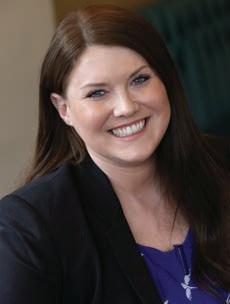
“I have a wonderful working relationship with Seamus so I was hugely excited when he asked me to help him launch the new business,” Smith says. “I’m really honored to have been given this opportunity. Seamus is a pleasure to work with and is an inspiration to people working within the care sector; he always puts people first and truly values people.”
In her role, Smith will be responsible for the day-to-day operations of the homes as well other areas, including recruitment, occupancy growth, marketing and quality.
It promises to be a busy time for Smith with the launch of eight luxury care homes over the next three years in the South, Southeast and Southwest of England. The roll-out begins with Portsdown View in Bedhampton, Portsmouth and The Chase in Huntingdon, Cambridge this year.
Smith says each home will offer a range of hospitality services and bespoke activities, and they aim to define the next level of care.
The chief operating officer adds that Connaught’s ethos of “putting people first” will be key to achieving its mission of supporting residents to live a life more extraordinary.
“We will have a laser focus on supporting our people, as having worked on the front line myself I know there’s nothing more important to the residents and the relatives than the people who are actually delivering the care,” Smith says. “Every decision we make will be on the basis of how it will benefit our residents and our team.”
The care leader says Connaught will
be focusing on “attracting the very best talent from the care sector” through a “highly generous and competitive” remuneration and incentives package.
The luxury care home provider has committed to a £14 an hour minimum wage in order to help staff with the rising cost of living and to attract the best people.
“As far as I’m aware that’s over what most providers are paying,” Smith says. “We are not afraid to pay people well because we know that will enable us to attract the best people, and we will be able to retain them with our culture and our appreciation of them. In turn this leads to the highest quality of care being delivered, and you reap the benefits in the long term. It is certainly not all about pay, but we are confident this, along with our other commitments to reward and recognition, discounts and benefits, and investment in career progression and development, will make us an employer of choice.”
Paraphrasing the former Care Quality Commission chief inspector of adult social care, Andrea Sutcliffe, Smith says Connaught was committed not only to passing the ‘mum test’ by offering the best standard of care that families would want for their mothers, but also passing the ‘kids test’ by providing a working culture and conditions that parents would want for their children.
“You can have the very best and most competent manager and if you can’t provide them with the support and resources to do the job then they won’t be able to fulfil their potential,” Smith explains.
The luxury care home provider has chosen Nourish Care as its digital care
plan provider in order to help free-up time for managers and staff to spend with residents.
“Access to things such as the Nourish Insights’ reporting dashboard is an investment that is going to save so much time for the management of the home in terms of audits,” Smith says. “We want to provide all we can so that the management team can then spend more time with the residents.”
Acknowledging the highly competitive nature of the luxury care home market in the South, Smith says Connaught will offer a competitive all-inclusive pricing structure to provide fee transparency for residents and their families.
With weekly fee levels beginning at £1,400, the all-inclusive package will include everything from private dining with family members, to spa treatments, hairdressers, barbers, chiropody and excursions close to the home and further afield.
2023
2024 Three homes: Henbrook House in St Neots, Winchelstowe, Chichester
2025 Three homes: Crawley, Stratford Upon Avon, Bishops Stortford
22 | APRIL 2023 CARING-TIMES.CO.UK business | in focus
Care’s new care home pipeline
Amanda Smith
Connaught
Two homes: Portsdown View in Bedhampton, Portsmouth
The Chase in Huntingdon, Cambridge
“We will be offering incredible hospitality, along with bespoke events and activities,” Smith notes.
The homes will be predominantly residential with dementia care, and possibly some nursing.
“We are really keen to provide a tailored, person-centred approach to dementia care and will be seeking to partner with experts to develop our dementia strategy,” Smith says.
She says Connaught is well into the recruitment process for its home Portsdown View which is due to open in June.
Managers and a deputy manager have been appointed for both Portsdown and The Chase with the process of recruiting department heads also under way. Sarah Peach joins Portsdown View as general manager, having worked in the care sector for decades, and brings a wealth of commissioning experience. She is supported by Lukasz Irzabek as deputy manager, who has many years’ experience as a registered manager.
When asked by Caring Times what values she is looking for in her team, Smith notes: “There always has to be a mixture of values and experience in the people we recruit. It’s important to recognise everyone can have something different and amazing to contribute. We will find people who operate with
integrity and compassion, and the care they deliver will be second to none. I firmly believe when your work is something you really enjoy it’s not really work.”
While acknowledging the difficult recruitment climate, Smith says Connaught’s highly competitive salary rate, as well as its work culture offering the autonomy, trust and resources to do the job, had definitely helped attract the best people.
Word of mouth has been key to attracting new staff, she adds. “We have managers who have worked in local areas who are very highly regarded, which naturally in turn attracts staff who want to work alongside robust leadership,” Smith notes.
The chief operating officer says Connaught was keen to work with providers of recruitment software, as part of its commitment to challenge itself and be innovative.
At a senior level, Iain Gordon (chief financial officer) and Dan Bridges (commissioning director) will be joining Connaught’s leadership team of Halton, Tim Carroll (commercial director and Paul Dixon (director and manager director of Lawrence Baker).
With the key elements of the business coming together, Smith says she is relishing the opportunity of establishing
a new care entrant in a ferociously competitive market.
“It’s really exciting to be able to start from the beginning and really look at our internal systems map and look at what systems integrate well, and make some smart decisions about who we partner with,” she says. “The more we can streamline and digitalise our processes, the more we can avoid duplication so that again the management team will get to invest that time back with the residents and their teams.
“When we are looking for instance at the purchasing of moving/handling equipment we are not just looking at price, we want to be sure we are partnering with a provider that cares, that works in partnership to also provide advice and training. When we select a wine supplier, we will also be looking at that personal relationship for them to come in and do a wine tasting evening for our residents, or a team building event for our colleagues. All of our partnerships should provide a really robust and thoughtful support package for the home, so that the team can do what they need to do, and do what they do best.”
Inspired by Smith’s passion and dedication, Connaught Care looks set to be one to watch in the years ahead in Southern England’s thriving luxury care home market.

CARING-TIMES.CO.UK APRIL 2023 | 23 in focus | business
Portsdown View in Bedhampton
Family-owned Athena Care Homes appointed Desiree Jooste as registered general manager at Ashlynn Grange Care Home in Peterborough. Jooste has more than 30 years’ experience working in health and social care, in home, regional and operational management roles.


Retirement villages provider Audley

Group appointed two of its senior management team to the executive board: Philip Rolfe, development director, and Sian Hammer, who becomes group sales and marketing director. Rolfe joined Audley three years ago, having worked in partnership with Audley for many years prior to joining and has experience of the retirement living sector. He will be responsible for all pre-development and construction of Audley’s new villages. Hammer is an experienced sales and marketing director who joined Audley in 2021. She has experience in delivering organic and acquisitive growth and leads the sales and marketing functions across both Audley and Mayfield villages.
Mike Seabrook has been appointed home manager at Hartford Care’s Bethel House care home in Barton on Sea, Hampshire. Seabrook has worked in the care industry for more than 20 years and


Rachel Yoxall was appointed as general manager of Signature at Moorlands Lodge care home in Hindhead, Surrey to lead a team of 120 providing residential, nursing, dementia and respite care to 92 residents. Yoxall is an experienced healthcare professional who worked as a ward sister at Queen Alexandra Hospital in Portsmouth for eight years. She joined Signature at Moorlands Lodge five years ago as a nursing manager. Two years into the job she was promoted to deputy manager.
the group’s nurses in personalising care plans around any NAPPI requirements that an individual may have.

Cornerstone Healthcare appointed Jonathan Spencer as its NAPPI (NonAbusive Psychological and Physical Intervention) trainer to work across all of its services. Spencer will be responsible for delivering training on psychological and physical techniques to all staff and assisting



HC-One’s Chris Bonner was promoted to the newly formed role of executive chef and nutrition and hydration lead. In his new role, Bonner will be responsible for the development of HC-One’s culinary offer, working with internal and external teams to create menus for those living in HC-One care homes. He will centrally coordinate and direct the work of HC-One’s development chefs to ensure the homes provide quality and nutritional menus through the training and development of its onsite teams. Bonner has worked in the catering industry in different sectors over the past 25 years. He previously worked as a head chef for five years at Helen McArdle Care, before the group was acquired by HC-One, which promoted him to the new role of development chef for the company.
Milewood Healthcare appointed Richard Jackson as chief executive of its residential care and supported living services following the departure of Chris Hartshorn at the end of last year. Jackson has more than 30 years’ experience of the health and social care sector. Milewood also appointed Sandie Foxall-Smith as its chair.
24 | APRIL 2023 CARING-TIMES.CO.UK
joined Hartford Care last year as deputy manager at Bethel House.
business | people moves in association with
Desiree Jooste
Mike Seabrook
Rachel Yoxall
Jonathan Spencer
Chris Bonner
Richard Jackson
Audley Group
Specialist care provider, Exemplar Health Care, opened a new care home in Castleford, West Yorkshire. Wheldale Heights, which is Exemplar Health Care’s eighth care home in the region, supports 24 adults living with complex needs, including those with complex mental health needs and neurodisabilities.
National home care franchise business Walfinch has relocated its headquarters to Wantage, Oxfordshire. The relocation to the 1,000 square foot site includes a training and conference room and parking, and is designed to support the company’s plans to double in the next 24 months.
personal care. The business occupies a substantial Edwardian property whose residents are a mix of self-funded and local authority-funded clients. Since 2000 the home has been owned by Aled Rees who has decided to retire.

Sandstone Care Group acquired Burscough Manor Care Home in Burscough, Lancashire. The 80-bed home, which offers luxury residential and specialist/complex nursing care, joins Sandstone’s seven other homes in in Lancashire, Merseyside, Powys, Wales and Shropshire.



Signature Senior Lifestyle formally opened its £14 million Signature at Caversham care home in Reading. To mark the opening, the home donated £500 to Caversham Good Neighbours, a charity providing transport to help local elderly people get to hospital, doctor’s appointments and shopping trips.

Gold Care Homes acquired Sonnet Care Homes which comprises two homes in Bocking, Essex: St Mary’s Court and The New Deanery, co-located in a 6.5-acre gated estate. St Mary’s Court offers specialist residential, dementia and nursing care, providing en suite accommodation for up to 90 residents with a diverse range of care needs.
New Care is set to complete work on a £12 million care home in Yorkshire in early May. Guiseley Manor, located in Guiseley Conservation Area in Leeds, will offer residential, dementia and nursing care. It will be New Care’s second home in Leeds, joining 74-bedroom Adel Manor.

Parklands Care Homes confirmed the closure of Mo Dhachaid care home in Ullapool following the safe transfer of its last three residents to other services this week. The care home operator announced in February it was being forced to close the home due to a “wave of rising costs” just six months after acquiring the service from Barchester.


A 66-bed luxury care home officially opened its doors to residents in Whitby. Mayor of Whitby, cllr Linda Wild, cut the ribbon to mark the official opening of The Mayfield Care Home, which is operated by Cromwell Care.


Care home owner Scott Morris purchased Erwhir Care Home in Carmarthen, which is registered with the CIW to accommodate up to 15 service users aged 65 years and over who require
Specialist care provider, Exemplar Health Care, began construction of a £5.8 million care home in Knowsley, Merseyside. Fernwood will be Exemplar’s seventh care home in the Liverpool region and will specialise in supporting 28 adults living with dementia, acquired brain injuries, complex mental health needs and physical disabilities, across two units.
CARING-TIMES.CO.UK APRIL 2023 | 25 property deals | business
Burscough Manor
Wheldale Heights
Guiseley Manor
Mo Dhachaid
The Walfinch team
Erwhir Care Home
A garden in Sonnet Care Homes' 6.5-acre estate
Signature at Caversham
Take small green steps
In our ongoing series, Aaron White, head of business services and sustainability at Oakland Care, shares small but effective changes care homes can implement to become more sustainable. This month he focuses on building a greener team through team engagement.

The great thing about being sustainable is that everyone knows it’s something we need to do, and hardly anyone doesn’t want to help take action to protect the environment for future generations. However, many people are unsure where to start, or feel they are unable to dedicate enough time or resources to the issue. The success that we have seen at Oakland Care started with ideas and a willingness from our front line team members and has since blossomed into a full companywide strategy with team members in all departments engaged in implementation.
As a start, rather than being overwhelmed with obstacles to tackling the bigger picture, providers should focus on what they can do right now – taking small steps to realise action.
First, putting together a team of champions in your business to act as green leaders is an invaluable first step. Their job role or seniority doesn’t matter, they could be a housekeeper or a nurse, a human resources co-ordinator or a chef but it is essential they have a passion for sustainability. Their passion needs to inspire and engage their colleagues so that collectively, the team can challenge how we do things on a daily basis and put forward ideas on how we could do things differently to make a difference.
It's important to remember that green champions must be self-nominated. Identifying and appointing someone as ‘green champion’ will not usually have the same result. We bring our champions together in a quarterly green committee meeting which can be face-toface or on Teams. The green champions will share things they have tried in their homes and issues they have identified. One idea will often spark 10 more, and often they are low cost, or no cost at all.
For example, one home started a butterfly farm to raise awareness about biodiversity and released 100 butterflies into its garden. When they shared that
with the green team, other homes decided to replicate the project. In another example, one site cut down its plastic waste by introducing a water dispenser and some reusable bottles. This approach is now in place across the group.
Another home joined a nationwide battery recycling scheme, which allowed it to obtain a free battery recycling box and appear on a map of battery recycling points. This promotes sustainability in the wider community as well as within the home, boosts footfall to the home, promotes it as a green business, and doesn’t cost anything. Now all of our homes have those boxes.

These are all examples of simple changes that we might not have adopted were it not for our green champions. Once you have done the small things, momentum builds for taking on the trickier things. If you can’t cover your
roof with solar panels right now, plant some flowers. Before you know it, people will be engaged and you will become a greener organisation, with the momentum and the ability to take forward the bigger changes.
Team engagement is absolutely essential for providers to become more sustainable and should be the starting point for anyone’s journey. Over the coming months, I will share more detail on the bigger changes we have made and how this has transformed Oakland Care to being the greener care choice.
Find out more about practical implementation of ESG at your care homes at the Care Managers Show at NEC Birmingham, 30 June – 1 July.
26 | APRIL 2023 CARING-TIMES.CO.UK business | sustainability matters
Aaron White
Caring is sharing sustainability
The social care sector delivers significant social value to society in supporting those in need of care or support to live healthy and fulfilling lives. The sector, and all of us involved in it, are directly helping to address a number of the UN’s Sustainable Development Goals. So, isn’t that enough? Do we need to do any more on sustainability? Clearly, in my view, not.
It’s not enough to talk about the positive impact the social care sector delivers without also addressing how we deliver these services. The end, I’m afraid, does not justify the means. Sustainability in all its aspects – environmental, economic and social – is as relevant to all those who operate in the social care sector as it is to every other business or public body.
Barclay’s excellent recent report on sustainability in the social care sector ‘Time to act: Healthcare at a turning point on ESG’ sets out clearly the case for greater action to be taken by the sector on sustainability. The report has been wellreceived by providers and opinion formers, but there’s a risk that, without follow-up and collaboration, the sector will not address the sustainability challenges it faces with the urgency required.
Bluntly, social care has been too slow to take action on sustainability. A group of us have therefore come together, determined
to support each other and to encourage the wider sector on our sustainability journeys. The new Social Care Sustainability Alliance brings together senior leaders with responsibility for sustainability issues within their organisations from across the social care sector.

The Alliance aims to:
• Identify key sustainability opportunities and challenges across the sector

• Share best practice within the sector and from other sectors
• Foster collaboration on key issues and
• Drive awareness and action across the sector, particularly for smaller providers without dedicated resource.
Membership is open to senior leaders from providers of all sizes, fields, type and business structure across the social care sector. Importantly, while the Alliance will draw support from across organisations supporting the sector, its core membership will come from the senior leadership of providers and operators.
I am honoured to serve as the Alliance’s founder chair and thrilled that it is being supported by:
• Barclays, whose report triggered the idea of the Alliance
• Addleshaw Goddard, whose team have been working with providers to encourage thinking on these issues, and
• BKR Care Consultancy, which has
recognised the importance of getting on the front foot on these issues.
Together, we hope the Alliance will establish a constructive, collaborative dialogue on sustainability issues across the social care sector to drive radical change right across the sector.
The Alliance isn’t a talking shop, it’s not about networking, nor is it an opportunity for marketing positioning. None of us is doing enough yet and too many providers don’t even know where to start.
The motive for addressing sustainability challenges shouldn’t be about securing competitive advantage in the shortterm. Rather, our aim should be about working together to address the key global challenges we all face to create the longterm conditions for long-term success for all of us.
Sustainability, after all, is about creating the conditions for businesses and organisations to thrive, but doing so within the parameters of what the world’s natural resources can support. Or, as the United Nations Brundtland Commission better defined it: “Meeting the needs of the present without compromising the ability of future generations to meet their own needs.”
The Social Care Sustainable Alliance is about galvanising meaningful change, inspiring others, working together on really tough questions, and helping providers of all sizes and shapes to join us on this journey. I am really pleased by the welcome that the Alliance is receiving from across the sector. Do come and join us.
To find out more, contact: jonathan.freeman@caretech-uk.com
ESG will be among the exciting topics on the agenda of the operational excellence stream at the Care Managers Show at NEC Birmingham, 30 June – 1 July.
CARING-TIMES.CO.UK APRIL 2023 | 27
Jonathan Freeman introduces the Social Care Sustainability Alliance – a new initiative for senior leaders with responsibility for sustainability issues.
matters | business
Jonathan Freeman
Overcoming poor CQC ratings
Ridouts’ associate solicitor Gemma Nicholas explores the difficulties providers face getting the CQC to re-inspect and re-rate their service, in light of the regulator’s change in agenda this winter to increase capacity in the sector

The impact of a poor or inaccurate rating
In accordance with its guidance ‘How CQC monitors, inspects and regulates ASC Services’, the CQC should approach each inspection “by looking for good practice”. However, providers repeatedly find that the CQC inspects in response to whistleblowing concerns and the inspection becomes a process of the regulator collecting evidence to support allegations or concerns. Such an approach taints the inspection and leads to disproportionate judgements.
The factual accuracy process does not result in the publication of a factually accurate inspection report when provider’s challenges can be senselessly rejected by the CQC. The rating review process is limited in scope and not an extension of the factual accuracy process or a second bite at the cherry and, due to limited success, providers are left with seeking legal recourse through costly judicial review proceedings.
Does the CQC recognise the impact of a poor and inaccurate rating?
Providers can request an inspection at any time. It’s a good idea to make a request when the rating is not reflective of the service, either because it was inaccurate when applied or the service has since improved. Poor ratings can:
• Have a negative commercial and reputational impact
• Impact the provider’s relationships with the community, commissioning bodies and families
• Affect the recruiting staff and marketing to prospective residents.
While the CQC acknowledges in its ‘State of care report 2021/22’, the difficulties providers face in the sector such as recruitment issues, the regulator is not sympathetic to the cycle that providers are in when stuck with a poor rating. The results of a poor rating such as recruitment issue can hold providers back from improving.
Does the CQC recognise improvement?
Regarding the current crisis in the NHS, the CQC announced that it would adjust its regulatory activity up until the end of this month, which would include inspecting providers with a Requires Improvement or Inadequate rating where evidence shows there has been improvement, with the aim of creating more capacity for discharge to adult social care by increasing the number of providers with a Good or Outstanding rating. This is not the first time the CQC has published adjustments to its regulatory approach. Back in October last year, in an executive board meeting the CQC declared that an operational priority of the CQC in adult social care was “inspecting to increase capacity and recognising improvement”.
These statements are high level, resulting in the CQC not being strict in observing its announcement. Due to the high number of services with poor ratings the CQC’s default is for inspection teams to plan inspections of the services in their
portfolios based on risk, abandoning inspections focused on acknowledging improvements. Providers find that the positive statistics which illustrate an improved service are used by the CQC to deny that a poor rating is having a negative impact. This includes evidence of a service maintaining its number of residents, the local authority not placing an embargo, or the service not needing support from the local authority.
According to its 2021 strategy, the CQC is aiming to move to “more dynamic and flexible regulation that provides up to date and high-quality information and ratings”. This has not been seen to date. What we are seeing is that the current approach to regulation/ inspection is leading to an increase in the number of services being rated as Inadequate or Requires Improvement. Timetabled inspections provided the service and the public with certainty. One hopes that the CQC’s new regulatory system/single assessment framework expected at the end of this year, makes a difference.
business | legal & regulatory 28 | APRIL 2023 CARING-TIMES.CO.UK
Gemma Nicholas
We
Ahead of our Care Managers Show this summer we find out how managers can develop their skills





care
31 CPD
Head of marketing, Nicola Tudor, discusses Skills for Care's recent #KeepLearning campaign
36 ANNIVERSARY
Karolina Gerlich marks her third anniversary as chief executive of The Care Workers' Charity
44 CARE MANAGERS SHOW
32 CT ON THE ROAD
visit Barchester's latest care home Shawford Springs near Winchester
care contents
31 CPD IN FOCUS
Skills for Care discusses its recent #KeepLearning campaign
32 C T ON THE ROAD
We visit Barchester's new Shawford Springs care home

36 ANNIVERSARY
Karolina Gerlich celebrates three years as boss of The Care Workers' Charity
38 CHEF OF THE MONTH

Monica Szabo of Sanctuary Care’s Wantage Residential and Nursing Home

39 10 QUESTIONS WITH
Leanne Stubbs registered care manager at Home Instead Southport and Formby



40 NORRMS’ BLOG
Columnist Norrms McNamara on the daily challenges of living with dementia

41 END OF LIFE CARE

Ruth French of Stow Healthcare on the importance of discussing death
42 CARE FOR TOMORROW
New product innovations from MyndVR and Peak Medtek and the DHSC provides an update on the digitalisation of social care
44 CARE MANAGERS SHOW
Ahead of our Care Managers Show this summer we find out how managers can develop their skills
care | welcome
30 | APRIL 2023 CARING-TIMES.CO.UK 31 32 36 38 39 40 41 42
An appetite to #KeepLearning
At Skills for Care our role is to support the social care sector, including through sharing information, resources and insights, to help people working in social care with key areas of their work.
We run regular communications campaigns to help us do this –sharing resources, data, blogs, articles and interviews across our website, social media, newsletters and other communications channels.
To kick off 2023 we focused our first campaign of the year on learning and development for social care workers, with our #KeepLearning campaign running through January to March.
We were delighted to see how much people working in social care have engaged with the campaign and were really pleased to hear feedback that people have found the campaign useful.
A large part of our #KeepLearning activity was focused on highlighting the important effect that providing learning and development has on lowering staff turnover rates.
Skills for Care data tells us average turnover rates decreased from 41.2% among staff who had no training to 31.7% among those that received some form of it. Turnover was reduced even further, by 9.1%, for care workers who received more than 30 instances of training when compared to care workers with just one instance of training.

We shared our data highlighting the positive impact that learning and development has on staff retention in
what was one of our most-read blogs in March. So, it’s clear to see that social care managers are keen to evaluate and understand the impact that ongoing learning and development will have for their staff and organisation.
Throughout the campaign we’ve also noticed that our information around induction training has been popular. This is another key element in supporting staff retention through learning and development.
Additionally, our articles about different learning opportunities and funding options available in 2023 –including learning for managers – have been some of the most read topics through the start of this year. So, it’s clear that managers have been eager to get the year started by planning in training for both themselves and their teams.
The campaign has also allowed us to
gain insight into the learning habits of people working in social care. One poll we ran found 71% of respondents’ favourite way to learn was ‘on-the-job’.
We can feed these insights into the wider social care sector and also consider these when planning the resources and support that we’re offering to the workforce.
Our #KeepLearning campaign has been a really positive way to start the year. It’s truly reiterated how important ongoing learning and development is for the social care sector and how enthusiastic and engaged people working in social care are to keep on developing and building their skills and knowledge to continue to provide the best quality care, even in busy and challenging times.
All our #KeepLearning blogs, articles, information, resources and other support can be found on our website: skillsforcare.org.uk/KeepLearning
cpd in focus | care CARING-TIMES.CO.UK APRIL 2023 | 31
Nicola Tudor, head of marketing at Skills for Care, discusses its recent #KeepLearning campaign and the enthusiasm among the sector to continue to develop.
Nicola Tudor
“We were delighted to see how much people working in social care have engaged with the campaign and were really pleased to hear feedback that people have found the campaign useful."
Shawford Springs into life
Barchester plans 19 new care homes by the end of next year. Charlotte Goddard visited its latest addition Shawford Springs as it prepared to open its doors to residents.


There was a palpable sense of excitement about Shawford Springs Care Home, as the home got ready to welcome its first-ever residents. The newly recruited team, put together by general manager Julie House, was gathered in the second-floor dining room for life enrichment training when Caring Times paid a visit.
The intensive month-long training even included a scavenger hunt designed to help staff get to know every nook and cranny of the box-fresh building. Today, the team was learning how to use the home’s up-to-date technology for the benefit of the residents, from personalised musical playlists using iPads and Sonos speakers to interactive activities on the ‘magic table’.
It’s been two years since the ground was first broken on the plot of land that was to become Shawford Springs, although planning for Barchester’s newest home started some time before that. Located in a cluster of small villages some four miles out of the prosperous city of Winchester, the 64-bedroom care home is situated near an area of natural beauty.
In the build up to opening day Sonja Jueterbock, homes services advisor, spent time building links with locals, including visits to the nearby garden centre, doctor’s surgery and fire station. Leaving no stone unturned in her bid to position Shawford Springs in the heart
of the community, she even took the opportunity to nip out and have a word with Caring Times’s taxi driver.
Acting as the hub of the home for residents, staff and visitors, an inviting café sits in the lobby. Emergency service workers are encouraged to drop by for free drinks and cake during their breaks and the door is always open to the wider community. House’s office is situated close to the home’s entrance, and friendliness and kindness are her key values, along with person-centred care. “When someone comes in, I think it is important they know I’ve got a daughter, they know I have got a dog,” she explained. “If you are friends with someone they know those kinds of things about you.”
As Shawford Springs fills up from the ground floor upwards, with plans to reach full occupancy by 2025, the second floor will remain empty for a while. Local groups, such as yoga classes, are invited to make use of the space – as long as residents are welcome to join in.
Besides the café, the ground floor is home to a hair salon, a private dining room for celebrations, a lounge and a main dining room. A cinema includes footstools and blankets to snuggle under. “We can show anything residents might want,” said House, who has been a care home manager for the past nine years. Spa bathrooms use coloured underwater lights and music to create a sensory but accessible experience.
Holly Rance, Barchester’s head of interior design, has created a stylish and welcoming feel throughout, with beautiful and interesting objects to catch the eye at every turn. The communal lounge has pretty wing-backed chairs arranged in clusters. “Gone are the days where care home lounges had a big circle of seats,” House pointed out.
Furnishings are attractive and functional, with elegant piping on armchairs making them easier to see for those with failing eyesight, for example. In the corridor hangs a planner showing the week’s activities, from arts and crafts, tailored to the interests of the residents. “Our big selling point is that
32 | APRIL 2023 CARING-TIMES.CO.UK
care | ct on the road
we are entirely focused on the resident,” said House, who hopes people will get involved with everything from the running of the home to creating their own clubs and societies.
Outside, a sensory garden will blossom with scented plants in the spring. Another area features raised beds and a potting shed, as well as a small bandstand. “Our chef hopes residents might be interested in a gardening club so they will able to grow food from earth to plate,” commented House.
On the ground floor bedrooms look out onto the garden, with access dependent on a resident’s needs. Cupboards are bolted into the wall to keep them safe, and lockable storage areas with thermometers are specially designed to hold medication. “Residents can keep that key and manage it themselves, or we can hold medication in our double locked office if they prefer,” explained House.
Weekly fees start at £1,450 depending

on care needs and the type of room. Fees include day-to-day services such as 24-hour routine care, assistance with personal care, meals, snacks and drinks, activities, heating, housekeeping and laundry. Every room has an en suite bathroom with non-slip flooring, and premium rooms include a three-quarter size bed, a fridge and a coffee machine. One deluxe suite includes bedroom, bathroom and a lounge with a small kitchenette.
The second floor mirrors the ground floor with its own dining room and lounge, as well as a small chill-out room with books and safe candles. Meanwhile the first floor is home to Shawford Springs’ Memory Lane residence for people living with dementia, with different coloured corridors to aid navigation. The garden corridor has green walls and an earthy carpet, with pictures of flowers and greenhouses, while the blue seaside area sports seashells and beach huts. A travelthemed corridor has pictures of buses and bicycles.
A quiet lounge gives residents the opportunity to sit with their family or relax in a reclining chair and listen to calming music. Colours in the bright and airy dining room and lounges are more muted than on other floors, creating a sense of tranquillity. In the dining room, residents will be served their food on coloured plates. “Those living with dementia don’t always recognise mashed potato on a white

plate, for example,” said House. “On a yellow plate it might become more visible.”
A sensory room houses the magic table, where residents can virtually pile up autumn leaves or pop balloons with a satisfying sound. Rummage boxes, an interactive toy cat which reacts when petted, and other resources support those living with dementia. “A rummage box contains things that someone might find interesting, which they can sort and fiddle with, and look at,” explained House. Boxes will be themed around the interests of residents. “We will have weighted dolls as well – they are a real comfort to hold,” she says.
The top floor houses everything that keeps a care home running behind the scenes, including a state-of-theart kitchen that resembles a spaceship control room, a massive laundry, a plant room and staff room with showers and lavatories. Head chef Clifford McCrae is looking forward to preparing meals for residents in his new space. “Every single piece of kit that you could possibly have, I have got,” he says.
The team clearly had a genuine excitement about meeting the first residents and discovering their likes and dislikes, because until they arrive the home is in a state of potential. However well-equipped the building and welltrained the staff, Shawford Springs will only blossom into a home when the first residents move in and shape it to meet their own needs.
CARING-TIMES.CO.UK APRIL 2023 | 33 ct on the road | care
Do you know or work with someone who is an unsung hero in a care home?
Ontex has teamed up with Caring Times once again to reward those working in care homes who are always ready to go that extra mile.
There are thousands of people working in UK care homes that make a real difference, whether it’s behind the scenes in the laundry room, preparing meals in the kitchen, or direct personal care of the residents. We’re looking for those that go beyond the job description. For example, it could the gardener who brings a resident their favourite cookies, or a housekeeper who helps a resident to rediscover their hobbies – we’re searching for those who bring a little bit of extra joy into the care world. Your unsung hero may be a colleague or someone else you know, and now is the time to reward those individuals that have made a genuine impact on their particular place of work!
If you know of anyone that fits the bill, entries can be made online at: caring-times.co.uk/care-home-heroes

So go to this link and tell us, in 400 words or less, why you think your nominated person deserves to win. Make sure to include an example of when they have gone the extra distance to make a difference.
All winners will be announced in June and will be presented with their certificate and Love2Shop vouchers or similar gift card on Friday 30 June at the Care
TERMS AND CONDITIONS
Managers Show at the NEC.
Three runner-up winners will each receive £250 Love2Shop vouchers or similar gift card, and the Overall Winner will receive a £500 Love2Shop voucher or similar gift card.
The three runner-up winners will feature in the September, October and November issues of Caring Times magazine, and the Overall Winner will feature in a special feature in the December issue of Caring Times
This prize draw is organised by Ontex, Weldon House, CorbyGate Business Park, Priors Haw Road, Corby, NN17 5JG. It is governed by the laws of England and Wales and it is subject to the following conditions:
• The prize draw is not open to employees or contractors of Ontex or any person directly or indirectly involved in the organisation and running of the competition or their direct family members.
• No purchase is necessary to take part in the prize draw.
• The prize draw is open to UK residents only who are aged 18 or over.
• Closing date for entry is Friday 19th May . Winners will be notified by 1st June 2023
• All winners will be presented with their Award at the Care Managers Show if they are able to attend on Friday 30th June .- otherwise they will be sent a certificate
• Permission will be required for Ontex to contact the winners and visit them to hand deliver the prizes when possible.
• If the winners do not confirm acceptance of his/her prize within 7 days he/she will automatically forfeit the rights to claim for the prize. In the event of the prize not being claimed, Ontex reserves the right to select an alternative winner via any means that Ontex feel appropriate.
• By participating in the prize draw, you declare that you accept these terms and conditions unconditionally. There is no cash alternative.
34 | APRIL 2023 CARING-TIMES.CO.UK care | promotion
2023
Care Homes Heroes 2023 offers a unique chance to celebrate the dedication of all those who go above and beyond to keep care homes running. It’s a brilliant way to shine the spotlight on people who get on with their jobs unseen and unheard, but make a real difference.
“This is the fifth year we’ve worked with Caring Times for the Care Home Heroes and we absolutely love it because it’s important to shine a light on those who go above and beyond for their residents,” commented Angela Gillespie, distributor channel manager at Ontex. “And it doesn’t have to be a grand gesture - it’s the little, consistent things that really have an impact on someone’s life.”
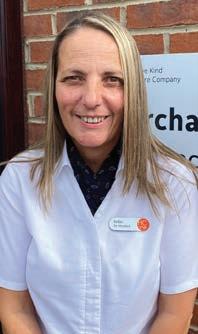

Last year, we received over 350 entries and it took a panel of five to decide the finalists. Gillespie continued: “It’s a difficult competition to judge because each person is so deserving. My top tip when nominating somebody is to use a particular example with lots of detail for how they have made a difference and how this impacted others – good luck to all nominees!”
Overall Winner 2022: Nicola Mould, home manager, Orchard Mews, HC-One Care Home Heroes 2022 Overall Winner was Nicola Mould. Nicola was nominated by community nurse, Jennifer Dodds, whose mum was a resident at Orchard Mews. “My Mum suffered from Alzheimer’s and was discharged from hospital post-Covid with deteriorated condition for palliative care,” says Jennifer. “Nicola made every effort to support my Mam, myself and my siblings during such a traumatic and sad time. She went above and beyond her role to support and help us all, often staying at work hours past her shift ending when mum deteriorated to wait for the GP to review and implement a plan and ensure Mam was comfortable and pain free.”
“The Care Home Heroes competition is a great opportunity for us to recognise and reward those working in our care homes who are always ready to go that extra mile and have made a real impact to the lives of residents,” says James Tugendhat,
chief executive at HC-One. “We are always on the lookout for opportunities to celebrate our colleagues’ achievements. We were delighted that Nikki Mould, home manager at HCOne’s Orchard Mews Care Home, was selected as the overall winner of the Care Home Heroes competition in 2022,” he continues. “Nikki was nominated for being professional, empathetic and knowledgeable, and in recognition of how she delivers high quality nursing care and excels in the management of her amazing care team whose care philosophy is completely person-centred.”
Runner-up 2022: Karen Jones, domestic, Park House Care Home, Eastgate Care Karen Jones has been with Park House Care Home for just under 10 years, and her standards have never slipped. “Nothing is too much trouble for this lady who always clocks up to 50 hours a week making sure our home is extremely clean,” says Park House. “No speck of dirt escapes her.” During the pandemic Karen was fastidious in ensuring all recommended measures were put in place and the home received a glowing CQC Infection Prevention and Control report. Karen spends her spare time with the people who live at Park House, singing, playing board games and chatting.

Runner-up 2022: Paul Bond, housekeeper, Fremantle Trust
As housekeeper, Paul gets involved with most of the residents. After noticing a fishing magazine in the room of one resident, “RS”, Paul decided to make his wish to go fishing again come true. Along with RS’ daughter Tracey, he arranged everything from obtaining a fishing licence, sorting out a suitable venue, carrying out a risk assessment and organising a carer to accompany the two of them. Paul ensured that RS had an amazing day out, and took a photograph of the fish he caught and landed. “We were so pleased that we could fulfil RS’ dream,” says Fremantle Trust. “He has been to fish three times now and further plans have been made.”

CARING-TIMES.CO.UK APRIL 2023 | 35
promotion | care
Championing care workers
Marking her third anniversary as chief executive of The Care Worker’s Charity, Karolina Gerlich says it’s time to provide the care workforce with the reform, wages, career opportunities and recognition it deserves.

Having spent more than 10 years as a care worker, as well as being a voluntary chief executive for a leading campaigning organisation, Gerlich took the helm at The Care Workers’ Charity (CWC) in March 2020. The chair of the charity at the time was Ben Allen and since November last year Martin Jones, chief executive of Home Instead, has been in that role.
Gerlich immediately faced a baptism of fire with huge numbers of care workers desperately needing emergency support as they were forced to isolate during the first wave of the pandemic. The Covid-19 emergency fund was immediately set up and in the first week raised £100,000 and in the next two months the first £1 million that the charity had raised in one year.
The charity raised an unprecedented £3.2 million for care workers during the height of the pandemic in 2020 which meant a huge number of grants were paid to care workers. They were in desperate need of funding as they were losing income being unable to work with no Covid tests available at the time, very little PPE, working at the front line and making huge personal sacrifices, including staying away from their families to protect the people they supported with many workers losing their lives.
“The most important thing to us was to support as many care workers as quickly as possible,” Gerlich said. “They were on the front line. The government was not recognising that. We were applying for any funding we could find
to every trust and foundation that would listen to secure money to cover sick pay and shielding costs to care workers.”
In 2020, Gerlich focused on diversifying the charity’s income streams and growth. The level of support care workers needed confirmed that the CWC was necessary and that it needed to grow. The team and trustees worked on the new strategy and continued to develop the support the charity offered, adding mental health support as care workers were bereaved, overstressed, working extra hours and suffering burnout.
Buoyed by its fundraising success, the charity’s workforce has doubled in size under Gerlich’s leadership from five in 2020 to 11 currently.

“I am incredibly lucky to have an amazing team of passionate, dedicated, hard working individuals that strive to do right by care workers and do their best within constraints of such a small team,” Gerlich says. “We are also lucky to have trustees that understand the sector and who have been a great support over the last three years.”
The charity’s growth was marred by the sad death of operations manager Sara Berio in August 2021, however. “That hit us hard as a team and brought us closer together,” Gerlich reflects. “Losing Sarah so suddenly made me realise you have to cherish people while they are around.”
While ensuring that fundraising by the CWC continues to go from strength to strength, Gerlich is also a leading champion of the professionalisation of the social care workforce.
“Buoyed by its fundraising success, the charity’s workforce has doubled in size under Gerlich’s leadership from five in 2020 to 11 currently.”
“Having been a care worker myself for many years I have always felt very passionately that care workers have been vastly underpaid and underrecognised for the work they do and that needs to change, not just for the benefit of care workers but for the benefit of those who draw on social care and wider society,” Gerlich explains.
Led by Gerlich, the CWC lobbies government on behalf of the care workforce, as well as championing care workers to other stakeholders and the wider public.
“As people, care workers make a huge contribution to the wider society,” Gerlich notes. “They deserve to be paid fairly for the important work they do. Care work is difficult. Not just anybody can do it. Not just anybody should do it and people need to realise the most
36 | APRIL 2023 CARING-TIMES.CO.UK care | anniversary
Karolina Gerlich
important thing is that the national government realises this.”
While recognition of the care workforce improved thanks to their amazing work during Covid, Gerlich says this has not been followed by national investment.
“I think we are still in a desperate need for national government to be very bold and brave in reform and investment and to recognise social care as a service in its own right and not a prop up Cinderella service to the NHS,” the chief executive continues. “Care workers should have robust career progression opportunities and be paid a decent wage and not just at the National Minimum Wage level.”
Gerlich says care workers’ wages should be at a rate that is competitive with both the NHS and supermarkets to halt the ongoing loss of workers to healthcare and retail.
“Every care worker who works fulltime should be able to pay their bills, buy the food they want, clothe their
children and afford childcare and go out for a nice meal and have holidays,” Gerlich says.
“I don’t believe that if you work fulltime you should just be able to make ends meets. Remuneration needs to be fair and respectful and in recognition of the complexity and importance of the role.”
While almost a quarter of the social care workforce are on zero-hour contracts, Gerlich says she is not in favour of their abolition, however, as long as there is flexibility on both sides.
“You should be offered the options of a minimum-hours or a zero-hours contract,” the chief executive argues. “However, zero-hours contracts especially in home care are often the only option because of how social care is funded because providers are often not given enough funding to give the extra hours or to give people minimum hours. Abolition of zero-hours contracts is no silver bullet for solving the social care crisis. As with many things it comes
down to nothing but the funding and settlement for social care rather than individual level offers being made.”

Gerlich is also a passionate champion for the full registration of care workers in order to provide greater recognition and a sense of identity for the workforce.

“A professional body for care workers that is nationally recognised and holds qualifications and accountability and a place to come for help for support would be hugely beneficial for care workers and the people they support,” Gerlich says. “That is something we have supported for a long time.”
Looking ahead, the charity head says she will continue to champion the professionalisation of the care workforce as well as working tirelessly to raise funds for those in need.
“We would love to be able to influence national policy enough to change the status quo for care workers and will keep on campaigning,” Gerlich says.
“We invite any provider, local authority, supplier or care organisation to partner with us, join in on events with us and donate, or to help us raise more funds to support care workers as much as we can.”
With Gerlich’s campaigning passion undimmed after three highly successful years, the charity remains in the best possible hands as it offers vital support to the care workforce that supports and saves lives.
CARING-TIMES.CO.UK APRIL 2023 | 37 anniversary | care
Karolina speaking at the Care Sector Fundraising Ball
Chef of the month
relatives to make sure I know about any changes in their preferences or needs.
How do you cater for residents with dementia?
The colour and the shape of our modified meals is so important and I’m always thinking of new ways to make my food attractive and not just tasty, especially if I am using pipes to shape it. Sometimes a resident may struggle to choose what they fancy, so I make presentation plates for them to see, smell and taste what I’ve made, which can stimulate the senses and increase their appetite.
What’s your most popular dish?
My favourite dish to make and the one which makes the residents so happy is roast beef with crispy potatoes, parsnip chips, baby carrots and sprouts with homemade Yorkshire pudding and horseradish sauce.
What’s your own favourite dish?
Tell us about your background and how you joined Sanctuary Care
I discovered my passion for cooking, in particular making cakes, at an early age. I joined Sanctuary Care in 2015 as a catering assistant and six months later I was promoted to assistant chef and I’ve been chef manager since March 2022. Originally from Transylvania, I’m married with a daughter.
What is special about working at Sanctuary Care?
Sanctuary Care and the people at Wantage have become my family – the environment is fantastic, with a brilliant team, a great atmosphere and very supportive managers. I’m grateful as Sanctuary Care has made my dream of becoming a chef come true.

How do you vary your menu to provide choice for residents?
I like to give our residents the chance
to enjoy their favourite foods, according to their needs. There is always a large variety of cakes which are my signature. Sometimes a resident may fancy something that isn’t on the menu, so I will always prepare something just for them – from homemade snacks like sausage rolls, omelettes, or a bacon and cheese turnover.
What does your typical weekly menu look like?
Our menu is rich in all sorts of meat, fish, vegetarian dishes and puddings. Our residents love traditional roast meat dishes and homemade soups – mushroom and chicken are the most popular.
How do you meet residents’ nutritional and health needs?
I work very closely with the care staff and nurses to ensure that the residents’ food passports are up to date, and I regularly meet with residents and their
What represents me is my passion for cakes – it gives me such freedom to be so creative and I love it when they bring a smile to someone’s face. I always make our residents themed birthday cakes that are very personal to them – and when I see their happy faces, I can go to bed feeling happy. The residents also love homemade profiteroles, macaroons and cookies.
How do you make the dining experience special for residents and their families?
I always spend time talking to our residents getting their feedback, which helps me to shape the menu. We also love to do themed days, where the residents choose what they would like to eat. For a recent Italian day, they chose carbonara and pizzas, with tiramisu –and of course prosecco!
I also love to make our residents’ recipes – one lady recently gave me a special recipe for tangy lemon cake and she was so happy when I made it for her.
38 | APRIL 2023 CARING-TIMES.CO.UK care | chef of the month
Originally from Romania, Monica Szabo works at Sanctuary Care’s Wantage Residential and Nursing Home in Oxfordshire and won third place in its Masterchef 2022 competition.
Monica Szabo
10 questions with…
In our monthly feature showcasing the sector’s amazing managers, we find out more about Leanne Stubbs, registered care manager at Home Instead Southport and Formby, a service specialising in care at home.

Why did you join the social care sector?
From a young age I was keen to work in the healthcare sector in some way. A lot of my family worked for the NHS, and after my beloved grandad passed away after a battle with cancer, I knew that I wanted to support people who were going through a similar experience. I started a health degree, but after working part-time as a care worker I realised that social care was where I wanted to be.
What do you enjoy most about your job?
The best thing about my job is seeing clients and their families achieve a positive outcome because of the care they receive, especially when their expectations about the service have been exceeded.
Who is your social care hero and why?
Anthea Pilkington and Irene Hough, the owners of the company where I work, have been an inspiration to me. Both ladies have so much passion and love for the company and even though there have been challenges along the way, they have always stuck to their core values. They believe that the care service should promote independence and choice, and that people should be looked after in a way that supports them to live life to the full.
What’s the one thing you would change about social care?
The mindset that social care is all about ‘tasks’. I believe that care should be about building relationships as well as practical support. People are different, so the care they receive should be tailormade to suit their needs, and this means allowing care workers the time to really listen to the views and wishes of the people they care for.
What, in your opinion, makes a great home care worker?
Someone who is kind, compassionate
and personable, has a great sense of humour and always takes the time to listen to the wonderful stories that older people have to tell.
What do you do when life all gets a bit too much?
I like being outdoors, so to unwind I will go for a long walk in the countryside or by the sea. I love listening to the sounds of nature when out for a walk, I find it so calming.
What advice would you give your younger self?
Tomorrow isn’t guaranteed so make the most of every moment. Don’t worry too much, as long as you have done your best.
Which three famous people would you have to dinner and why?
David Attenborough, Joanna Lumley and Florence Nightingale. All three have led fascinating lives and I like that they have always stood up for those who needed help. Joanna Lumley would be a lot of fun I think,
What three items would you bring with you to a desert island?
A lifetime supply of chocolate, my kindle as I love reading, and a glass of prosecco!
What is your secret talent?
I am trying to learn to speak and read Greek, although I’m not sure it can be called a talent yet.
CARING-TIMES.CO.UK APRIL 2023 | 39 10 questions | care
Leanne Stubbs
My world is getting smaller
I have to say, that these past few weeks something’s been happening which I have dreaded for years, my world is getting smaller each day that passes.
What I mean is I have noticed my lifestyle has become much more reserved. An example is that where I would spend about three hours in a morning and an hour in the afternoon on the computer, these days I am lucky if I am on for an hour in the morning and not at all at weekends as it all becomes too much. I find myself struggling if I am on much longer. It’s as if the fog has descended once again in my mind, which is worrying in itself.
Sometimes I sit there, not daydreaming but transported to another place in another time. I know I have things to do, places to go, and yet I can’t seem to remember what I have to do. It’s as if I go into a catatonic trance, then, when I come out of it slowly, then the things I thought I had to do slowly disappear leaving me both frustrated and realising it was just my mind playing tricks on me.
This happens anytime day or night, where it used to be just early evening which is also very worrying. “Try not to worry”, I am told, but when your world around you is slowly starting to disappear and get smaller how can you not worry?
I know I have lived a lot longer than some with this disease but, as I always say, I am in weekly contact with so many people around the world who have lived with dementia for 20 to 25-plus years and they still do what I do on the internet, if not more these days, and good health to each and every one of them.


There must be so many who have come to this point, teetering on the precipice and either have no idea what’s going on or feel the same as I do and won’t, or don’t, want to talk about it, which is why I do in the hope it helps. Every atom in my body is fighting this in the hope it’s just another blip, but this does feel so very different as I’ve never spent so much time in my reclining chair or watching films on TV. Thank goodness we have apps we can download on TV these days.
On a positive note, I take away the fact that we have a new team leader for the memory café who is doing a fantastic job of running it and we, as I have always said, have the best team in the world who volunteer there – I really cannot praise them enough. In the next couple of months we will also have a new chairperson, secretary and treasurer for the Purple Angel dementia charity so Elaine and I can spend more time together and hopefully do what we have missed out on these past few years, but don’t get me wrong I’ve enjoyed every minute, wouldn’t change a second of it, and still do I might add, LOL.
November 2023 will be our incredible 10-year anniversary since the Purple Angel started and so much has happened since then, far too much to document here, but please feel free to google, LOL. I am hoping so much I will be around for that party and also able to enjoy it with every friend I have made along the way, both in person and virtually, but Till next time…
40 | APRIL 2023 CARING-TIMES.CO.UK care | norrms’ blog
Norrms McNamara
Dare to discuss death
Ahead of Hospice UK’s ‘Dying Matters Awareness Week’ in May, Stow Healthcare operations director Ruth French says talking openly about death and dying has never been more important.

The way we approach death and dying in social care will fundamentally affect those we care for, their loved ones and our staff. So, talking openly about death and dying has never been more important.
From 8-14 May, Hospice UK will be running its annual ‘Dying Matters Awareness Week’, this year focusing on death, dying and grief in the workplace. After three years in which our staff have had to face so much trauma, this isn’t a week any of us can afford to let pass us by.
At Stow Healthcare, this will be the third year that we have fully embraced this critical date in the diary. For the past two years, we have hosted a fantastic series of learning events to engage staff, residents, families and the local community with a series of standout talks including: organ donation, wills and power of attorney, the role of ‘death doulas’, humanist funerals and even the death rituals of ancient Egyptians. Feedback has been outstanding – staff even held informal ‘debrief’ sessions in their homes to talk about bitesize takeaways they can apply in their practice. This year we are moving to a mixture of in-person and virtual talks, hoping to reach an even wider group of people.
Sometimes it can feel hard to know where to start and how to talk about death in a way that is not distressing. This will vary in every care setting, and the bottom line is about listening to what people feel they need. Our colourful Mexican ‘Day of the Dead’ theme didn’t hit the mark with
residents in year one, so we adopted a more sedate tone the next year. Feedback from one family member has led to her joining one of our forthcoming sessions in May to speak about her experience being with her mum at the end of her life, so other relatives can feel better prepared. This is amazing and makes sure we can really deliver what people need,
and what they might be afraid to ask about.
Getting conversations at the end of life right truly means we can deliver the very best experience for those we care for and those they love. An honest and tender conversation at one home last year led to a resident receiving end of life care being able to get her first tattoo – a wish she thought she would never fulfil – a dainty pink freesia on her hand completed only hours before her death, and with her family present to support her. When told by the tattooist it might hurt, the resident simply replied: “Oh please, I’ve broken my femur before. I can handle a tattoo, especially if there’s a Jack Daniels waiting for me at the end!”
With a wealth of excellent resources available, from the Hospice UK website, to powerful reads such as 'With the end in mind' by Kathryn Mannix as inspiration, talk to your team now to see if you dare to discuss death and dying in a different way this year.

CARING-TIMES.CO.UK APRIL 2023 | 41 end of life care | care
“Sometimes it can feel hard to know where to start and how to talk about death in a way that is not distressing.”
Opening up new horizons
Hartford Care has partnered with US-based technology company MyndVR to launch virtual reality therapies in 10 its care homes across the South of England.

Kevin Shaw, chief executive at Hartford Care, said: “We want to be at the forefront of innovation in our industry and the use of virtual reality headsets in our homes is another groundbreaking initiative we’re extremely proud to establish. I’m looking forward to seeing the benefits this technology has for the residents in our homes, especially those living with dementia whereby research shows it can fight loneliness and alleviate anxiety.”
Studies have shown that VR-based digital therapeutics technology provides a broad range of benefits including improving mood and engagement,
reducing anxiety and pain, and better rehabilitative care by improving physical and occupational therapy outcomes.
A 2021 study conducted in the US found 92% of senior users experienced significant mood improvements, and 66% experienced a reduction in pain intensity. Through a combination of advanced software and hardware, MyndVR’s platform delivers a vast library of immersive content, which will empower Hartford Care’s residents to travel the world, visit a street they previously lived on, relive old memories and continue to engage, learn and explore from their homes.
Device reminds elderly to take their time
An innovative anti-falls device that reminds the elderly to take their time when getting out of bed has begun large-scale trials in care homes.
The Bide device has been designed by De Montfort University Leicester’s design unit with tech company Peak Medtek and is the brainchild of family GP Dr Tom Adler.

Adler, who began Peak Medtek to develop his idea, said: “We are very excited about these independent research projects. We deliberately wanted a very simple device that was intuitive and which did not make people feel that it was too complicated to use.
“The design unit has been very helpful in working with us to come up with a design that works for elderly people. It’s taken a long time to get here; we have done a lot of research and developed many, many different iterations but we
are delighted to be in this position now.” Bide works by sensing movement of the person or a change in the light. This triggers a pre-recorded message to start playing, reminding that person to take their time getting out of bed, or any bespoke message to help that person remain safe. Messages can be recorded just like an answering machine and come from grandchildren, family members or carers.
Discussions with users has suggested that having a familiar voice advising the person to be safe is most effective. Bide also has a function to provide a low-level light to provide a visual reminder to stay safe if they cannot hear the message because of hearing difficulties.
This month Bide will be trialled more formally via a real-world validation project in care homes across Sheffield, after a smaller pilot in a single care home coincided with a 100% reduction in fall rates in two frequent fallers. Bide has also been used in individuals’ homes where elderly people said it helped them feel more secure and a research project will also soon be starting in individuals’ homes in Nottingham.
Social care leaders will be discussing new products and techniques and reviewing whether they could affect the way managers and their teams operate at the Care Managers Show at NEC Birmingham, 30 June – 1 July.
42 | APRIL 2023 CARING-TIMES.CO.UK care | care for tomorrow
care for tomorrow | care
Digital uptake continues
Three years ago, at the start of the pandemic, we began an ambitious project to send thousands of iPads out to care homes. We knew that care staff were facing unprecedented challenges and we wanted to ensure they had the basic technology infrastructure to support video consultations with health professionals and to make sure residents could stay in contact with friends and family while visiting was restricted.
Fast-forward to now and we have a major programme under way, with a commitment from the government to invest at least £150 million in the digital transformation of the adult social care sector in England.
I often reflect on how much our approach was informed by what we learned from that initial iPad project, both from its successes and the mistakes that we made. We know that it’s vital to work closely with the sector, to listen to what you want, and also to understand what barriers you might be facing, so that we can adapt our approach. We know that there’s no one-size-fits-all solution to any problem. In our current programme, we have a local approach to how we allocate funding and support to social care, which helps us have better insights into what’s going on in your area and how we can work together to implement technology.
We also know that people working across the sector have a wide range of digital skills. For some people just the mention of the word ‘digital’ can fill them with dread, whereas other people can’t get enough of tech and gadgets. With this in mind we’ve published a digital skills framework aimed at improving digital literacy across social care and health. The framework was developed with support from Skills for Care and with input from care providers and organisations across the social care and health sectors. The final version will soon be available online to support social care employers to plan staff training or for individuals
to think about their own professional development.
In our work with care providers, we still hear stories about how those early iPads are in use in care homes, and it’s great to learn how their use has expanded beyond their original purpose. We’ve heard many examples of how staff are using them to input electronic care plans and to order medications online. Residents continue to use them to communicate with friends and family far away, but one of the best stories I heard recently was of the care home where the iPad is used to manage the residents own TikTok channel and to monitor views of their videos online.
Over the past year, I have been incredibly impressed by the innovation that I have seen in the sector, and by the enthusiasm to adopt new approaches. More than half of Care Quality Commission registered providers in the sector are now using electronic care planning solutions, with thousands having taken up funding available to implement one of our assured digital solutions. We want to make sure that everyone has the opportunity to make the move away from paper and towards digital record-keeping and we will continue to provide funding, which you can access through your integrated care system, to support you with this.
We’re also turning our attention
towards how other technologies can support you in delivering highquality care, or support people to live independently at home for longer. Simple tools like iPads or even smart speakers have a place in helping to achieve this, as well as more tailored solutions such as falls prevention technology. We’ll be sharing our plans for how providers can access our care tech funding offer over the next few weeks.
Lastly, we’re also working behind the scenes to launch a new website (which will be live later in the summer) to make it easier for you to find everything you need in order to benefit from the funding, training, and guidance that’s available to support you take advantage of digital approaches.
In the meantime, there’s more information about the funding and skills support available to providers on: digitalsocialcare.co.uk alternatively, email us at: england.adultsocialcare@ nhs.net.
Social care leaders will be discussing new products and techniques and reviewing whether they could affect the way managers and their teams operate at the Care Managers Show at NEC Birmingham, 30 June – 1 July.

CARING-TIMES.CO.UK APRIL 2023 | 43
The DHSC’s Social Care Programme deputy director Alice Ainsworth provides an update on the digital transformation of adult social care.
care | care homes
The management challenge
Care home managers often have extensive knowledge of care provision but may be less confident in their management ability. Charlotte Goddard finds out how they can develop their skills
New care home managers are not always prepared for the day-to-day challenges of their role. “Managers of care homes are typically very skilled carers but often have never had any training or education in leading people and services,” says Stephanie West, head of school at Arden University’s School of Health and Care Management.
A manager will find they have a raft of new responsibilities, which may include finances, regulatory issues, supervising staff, dealing with HR issues, recruitment, health and safety, marketing the setting, and understanding profit and loss.
Phillis Dzowa has been manager of Barchester Healthcare’s Newington Court Care Home since 2021. She says care home managers need to be able to communicate successfully with relatives, residents, team members and other healthcare professionals and have a firm grasp of regulatory requirements.


alternative qualifications.
“In my previous role as deputy manager I was just using my clinical skills, but when I became manager I had to start thinking outside the box,” she says. “When you are leading a whole home you have to be confident in using your own initiative.”
In Scotland care home managers are required to hold or gain both a degreelevel practice qualification (usually SVQ social services and healthcare at SCQF Level 9) and a management qualification at or above SCQF Level 9. In Wales care home managers and those nominated to deputise are required to hold a Level 5 diploma in leadership for health and social care services (adults’ residential management) or one of a range of
The Skills for Care website says the “core qualification” for managers in England is the Level 5 diploma in leadership and management for adult care. The Care Quality Commission requires registered care home managers in England to have the “necessary qualifications, competence, skills and experience”, but doesn’t specify a particular qualification. Gaining or working towards the Level 5 can be viewed as a positive indication the person is fit to carry out the role, but is not a legal requirement.
The Level 5 diploma aims to equip learners to demonstrate an “in-depth understanding and effective practice in leadership and management for adult care services”. However, there are some concerns that it doesn’t go far enough to equip managers with the skills they need. “The Level 5 gives a nice footing of leadership and clinical work to get them thinking but it doesn’t really go into depth,” says Mel Dixon, leadership and management skills trainer at Barchester Healthcare.
“Level 5 should be a minimum qualification, but it has been taken across the sector as that is what you
need, and then you stop, because there just isn’t the time or the money for ongoing training,” says West. Skills for Care research found that establishments with higher levels of staff undertaking learning and development were more likely to receive higher CQC scores.
Some providers have created their own programmes to plug the gaps. Barchester has developed a leadership development programme mapped to Chartered Management Institute (CMI) standards. Training includes the Level 5 diploma but also covers additional content, with staff given the opportunity to progress to a Level 7 diploma in strategic management and leadership. New managers take part in three days of workshops including a day on operational finance and contracts. Dzowa says she found the focus on leadership skills rewarding. “I had a very supportive mentor who helped me get through some of the modules,” she says.
Not all providers can deliver inhouse training but there are other options. Skills for Care offers a number of programmes including Moving Up, which supports black, Asian and minority ethnic leaders and managers, and Leading Change Improving Care,
44 | APRIL 2023 CARING-TIMES.CO.UK
“When you are leading a whole home you have to be confident in using your own initiative.”
Mel Dixon
Phillis Dzowa
a national development programme for new and experienced managers of adult social care services.

Arden University offers a Level 6 chartered manager degree apprenticeship in health and social care, and a Level 7 senior leader apprenticeship plus MBA. “There is much more focus on leadership and management skills than is in the Level 5,” says West. “This includes the fundamentals of finance and resource planning, leadership of people and services, and how you manage efficiencies.” CMI accreditation allows graduates to obtain a diploma in leadership and management alongside a degree in health and care.
Apprenticeships are free for employers that pay the Apprenticeship Levy and highly subsidised for smaller employers. “We should be maximising the use of
apprenticeships because of the way they are funded,” says West. The Level 5 diploma in leadership and management for adult care, for example, can be obtained as part of a leader in adult care apprenticeship.
However, some providers feel apprenticeships don’t work for them. Michael Beresford, head of learning programmes at Barchester, says the organisation tried delivering apprenticeships in-house but Ofsted requirements were too prescriptive. Ofsted inspects the quality of apprenticeship training that is delivered by training providers. “Ofsted was treating us as if we were a school or college, but we don’t have the same infrastructure to manage that process.”
The six hours a week apprentices are required to spend ‘off the job’ can also be a sticking point for employers, although the time can be taken in two-hour or three-hour blocks. “What the manager is learning, they will immediately feed back into the workplace as they progress through the apprenticeship,” says West. “Also it gives someone else a professional development opportunity to step up and manage the team for a few hours at a time.”
In a dynamic sector like health and social care it’s important to stay on top of changes in policy, practice and research, and managers need to be able to access quality continuing
professional development throughout their career. Skills for Care offers a number of one-day courses for managers on specific areas including performance management, self-management skills, and workplace culture. Some providers offer their own menu of CPD options: Dzowa has access to a range of bitesize leadership webinars and workshops. “Learning doesn’t stop at Level 5,” she concludes.
Management skills are in high demand. If you are a care home provider that gives your managers and aspiring managers access to management training, whether through apprenticeships, CPD programmes or in-depth bespoke courses, that's something to shout about. Boost recruitment, retention and marketing and show you provide gold standard support to your managers by signing up to the Caring Times’ accreditation scheme. Find out more at caremanagersshow.co.uk
Access free CPD sessions from Arden University and Skills for Care at the Care Managers Show at NEC Birmingham, 30 June – 01 July 2023.
CARING-TIMES.CO.UK APRIL 2023 | 45 care homes | care
“Ofsted inspects the quality of apprenticeship training that is delivered by training providers. Ofsted was treating us as if we were a school or college, but we don’t have the same infrastructure to manage that process”
Barchester Healthcare’s The Spires care home, Lichfield



46 | DECEMBER 2022/JANUARY 2023 CARING-TIMES.CO.UK
JUNE – 01 JULY 2023
BIRMINGHAM
BY DAVINA M c CALL
the Care Managers Show:
30
NEC
HOSTED
Attend
• Build your management skills
APPRENTICESHIPS & FREE CPD
• Invest in your professional development
Join workshops on topics including compassionate leadership, creating a ‘safety culture’, and digital transformation
Leave each session with a CPD-accredited certificate


Learn about opportunities including the Level 5 Diploma through to a Level 7 Senior Leader Apprenticeship qualifications
Look out for the ‘CT Training Accredited’ badge (see right) on care groups’ stands
FREE CPD, FREE TICKETS

CARING-TIMES.CO.UK DECEMBER 2022/JANUARY 2023 | 47 caremanagersshow.co.uk
care | business & property




48 | APRIL 2023 CARING-TIMES.CO.UK
EXPERTS:
our award-winning team on: 0207 448 8826 | care@christie.com
IF YOU’RE THINKING OF SELLING YOUR CARE BUSINESS, SPEAK TO THE
Contact
Name of property sold: Location: Registration: Purchaser: Seller: Price: Business transfer agent: Contact person: Name of property sold: Location: Registration: Purchaser: Seller: Price: Business transfer agent: Contact person: McGonagall House Dundee 31 Enhance Healthcare Undisclosed Undisclosed Christie & Co Martin Daw – 07764 241 280 Craigie Nursing Home Kilmarnock 21 GST Healthcare Undisclosed Undisclosed Christie & Co Martin Daw – 07764 241 280 Angus Ayrshire Name of property sold: Location: Registration: Purchaser: Seller: Price: Business transfer agent: Contact person: Erwhir Residential Care Home Carmarthen 15 residential Undisclosed Undisclosed Undisclosed Christie & Co Oliver McCarthy – 07702 809 198 Carmarthenshire Name of property sold: Location: Registration: Purchaser: Seller: Price: Business transfer agent: Contact person: Braintree Nursing Home Braintree 51 nursing Archers Healthcare Avidcrave Undisclosed Christie & Co Jordan Oborne – 07736 615 870 Essex
South




CARING-TIMES.CO.UK APRIL 2023 | 49
Contact our award-winning team on: 0207 448 8826 | care@christie.com business & property | care Name of property sold: Location: Registration: Purchaser: Seller: Price: Business transfer agent: Contact person: Parkside House Residential Home Penarth 38 residential – dementia Undisclosed Undisclosed Undisclosed Christie & Co Oliver McCarthy – 07702 809 198 Lanarkshire Name of property sold: Location: Registration: Purchaser: Seller: Price: Business transfer agent: Contact person: Parkside House Residential Home Penarth 38 residential – dementia Undisclosed Undisclosed Undisclosed Christie & Co Oliver McCarthy – 07702 809 198
IF YOU’RE THINKING OF SELLING YOUR CARE BUSINESS, SPEAK TO THE EXPERTS:
Name of property sold: Location: Registration: Purchaser: Seller: Price: Business transfer agent: Contact person: Northgate House Glasgow 59 Enhance Healthcare Undisclosed Undisclosed Christie & Co Martin Daw – 07764 241 280 Lanarkshire Name of property sold: Location: Registration: Purchaser: Seller: Price: Business transfer agent: Contact person: Heathfields Residential Home Bridgend 22 residential Undisclosed Undisclosed Undisclosed Christie & Co Oliver McCarthy – 07702 809 198
Glamorgan
Glamorgan
South


Thinking of selling your care business? Speak to the experts: E: care@christie.com | T: 020 7448 8826 christie.com Christie & Co sold 60%+ of individually transacted care homes in 2022 *based on care homes sold listed on carehomes.co.uk 60%
FOR SALE
The Lawns Tavistock, Devon
Freehold £650,000
Registered for 12, Learning Disability
Well positioned town centre location
3270388
T: 07764 241 310
LOOKING TO SELL? TALK TO THE EXPERTS. We have a large pool of buyers ready to invest in the UK social care sector.



Newbridge House, Bath
Freehold £1,750,000
• Attractive former care home
• 20 bedrooms over four floors
3470719
T: 07702 809 198
Manor House Liskeard, Cornwall
Freehold £950,000
• Detached home registered for 16
• T/O year end 31 December 2021: £584,318
3270297
T: 07764 241 310
Nursing Home, Cornwall
Freehold £1,750,000
• Registered for 20
• Detached and extended care home
3270387
T: 07764 241 310
Confidential Property
Care Home, Devon
Freehold £1,450,000
• Grade II listed care home


• Registered for 24
3270362
T: 07764 241 310
Confidential Property
Specialist Care Home, South Wales


Freehold £2,000,000

• Registered for 9
• EBITDA: £340,924
Care Home, East Yorkshire
Freehold £775,000
• Registered for 25
• Affluent residential village location

5471517
T: 07764 241 328
3470703
T: 07702 809 198
Former Llanyravon Court
Nursing Home, Cwmbran
Freehold £750,000

• Closed purpose-built care home
• Previously registered for 50
3470704
T: 07702 809 198
Confidential Property
Contact
0207 448 8826
our award-winning team
| care@christie.com
24 November 2023 | Platinum Suite, London

The National Care Awards returns in 2023 for its 25th year. We can’t wait to celebrate our silver anniversary event with all the gold star employees in the social care sector.

Whether you’re new to the industry or have joined us before, get ready to submit your entry when we open submissions, then secure your place at the prestigious and fun-filled National Care Awards.
Shop
nationalcareawards.com | #CareAwards23
Award sponsors Silver sponsor
Photobooth sponsor
Wellbeing, free CPD, technology… and a brilliant celebrity guest!
Leaders in everything from HR to creative thinking, from managing a team to coping with grief, will feature in a packed agenda of interactive panels and workshops.
caremanagersshow.co.uk/agenda
In addition to our six packed streams of content across the two days, we will have over 150 exhibitor stands. This is the ideal opportunity to promote your brand and learn about some innovative products that could revolutionise the way your team works.
Agenda NEC
Exhibition
The Care Managers Show is located in Hall 11 of the NEC and runs from 10am to 4pm on both Friday 30 June and Saturday 01 July. The agenda is repeated on both days, so you can choose which day to attend or come for both days to make the most of our free content!
The largest show in the UK dedicated to care managers



FREE TICKETS
caremanagersshow.co.uk
Hosted by everyone’s favourite TV personality, Davina McCall, the show will include a central entertainment stage as well as five core streams of content: Operational Excellence, Wellbeing, Home Care, Free CPD, and Technology.

Managers will leave the show having broadened their horizons, gained valuable CPD credits, and most importantly, had fun.


30 June - 01 July | NEC Birmingham

FREE TO ATTEND

caremanagersshow.co.uk


























































































































































